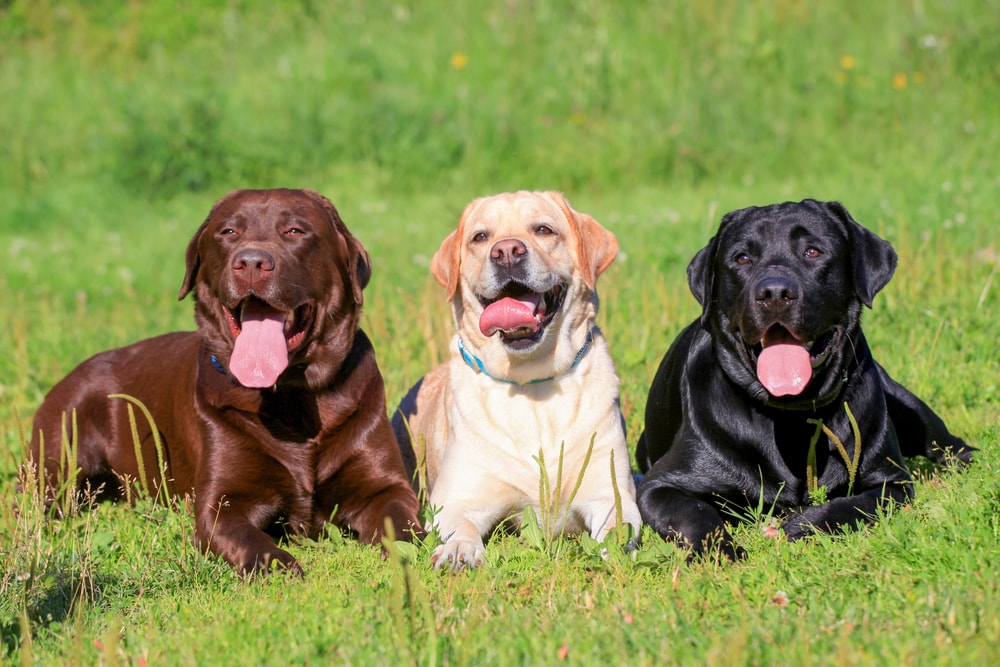It’s hard not to love a cute and loyal dog who cares about your moods and wants to make the best every day with you. However, it would be fair to say that certain dog breeds are more popular and sought after than others. That isn’t to say that these are breeds you should look for since you should be looking for a dog that’s more matched to your lifestyle. Nevertheless, if you’re interested in knowing which species people are vying for the most, then look no further. Here are the top 70 dog breeds ranked based on popularity. You’ll undoubtedly find one in here that you’ll fall absolutely head over heels for.
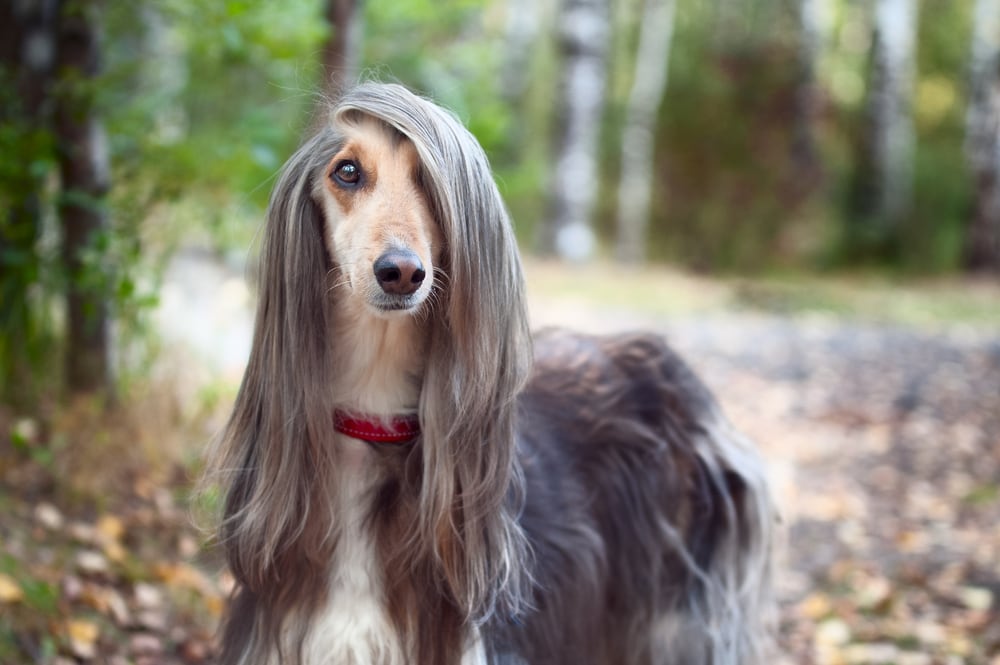
70. Afghan Hound
Afghan Hounds are probably one of the most recognizable breeds of dog around, with their thick, silky, flowing coats. Their coats aren’t just for show, though, as they once served as protection from the harsh climate in mountainous regions where they originally were from. These beautiful dogs need several hours per week of brushing to keep their hair free of mats and tangles and remove any debris. Regular shampooing and conditioning are also needed. Since they are Afghans, are sighthounds, and are excellent jumpers, they require lots of room to run around and will need a high fence so they can’t escape when exercising. Walking on a leash as exercise a few times a week would not suffice.
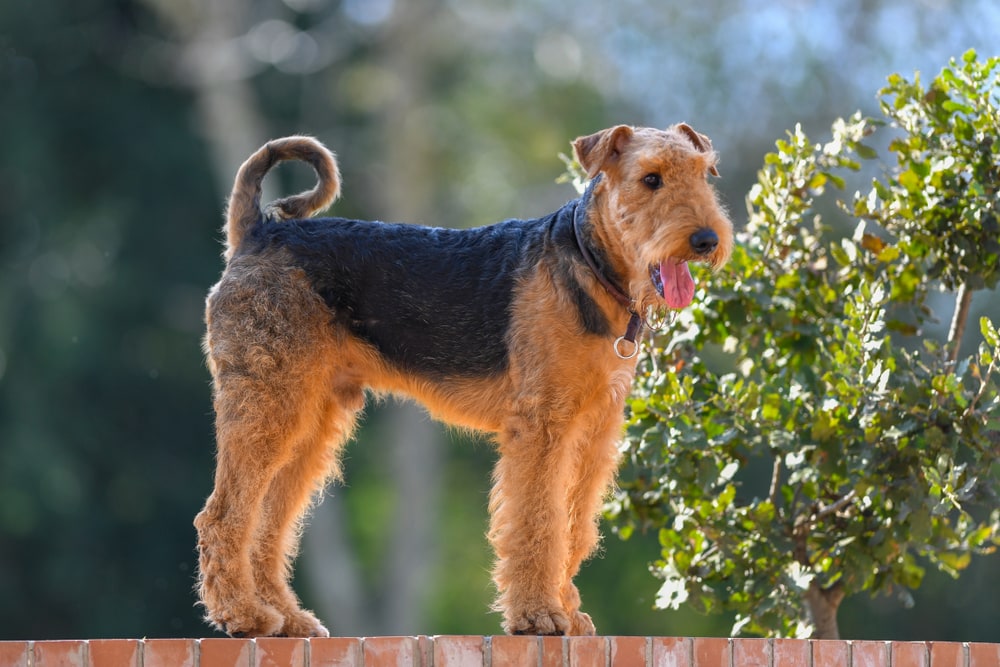
69. Airedale Terrier
The largest of all terrier breeds, the Airedale Terrier stands among the world’s most versatile dog breeds and has been distinguished as an athlete, hunter, and a great companion. These terriers have dense, wiry coats that are tan with black markings, as well as a sporty beard and mustache, neatly folded ears, and dark eyes. Airedales give the very picture of being on alert, and like their smaller cousins in the terrier family, they can be quite bold, stubborn, and determined. As long as these terriers get plenty of outside time with exercise, as well as playtime with their family members, they will be happy and satisfied.
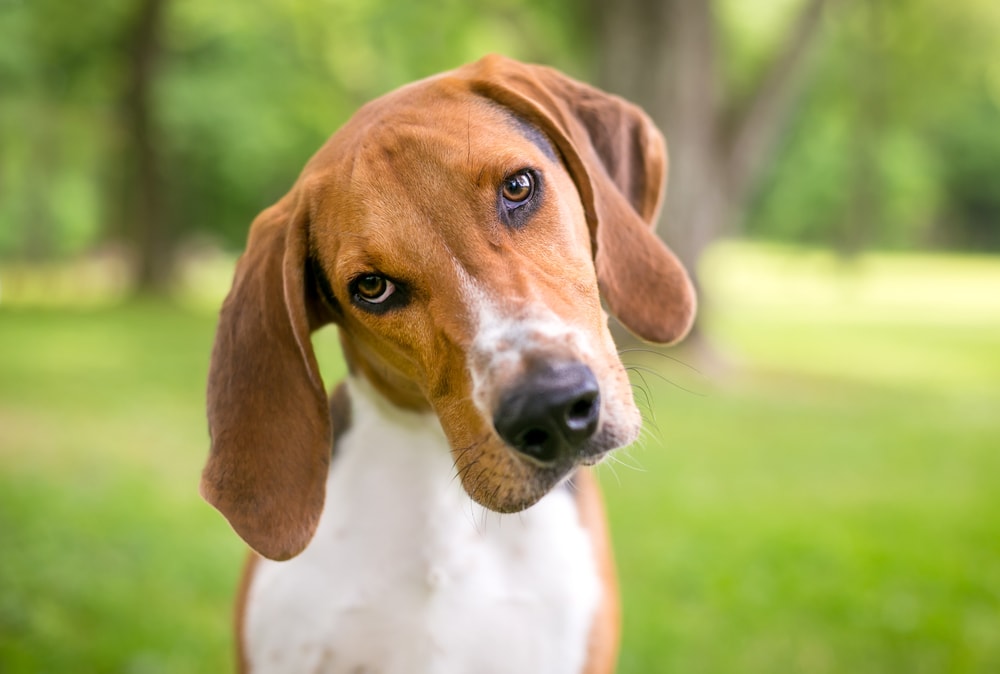
68. American Foxhound
American Foxhounds are both sleek and rangy hunters known for their endurance, speed, and work ethic. These good-natured, low-maintenance hounds get along well with kids, dogs, and even cats. When it comes to grooming, a short, once-a-week session with a bristle brush, rubber grooming mitt, tool, or hound glove is all you really need. This breed doesn’t need to be bathed unless it gets into something particularly messy while outdoors. Like all breeds, regular nail trimming sessions are a good idea.
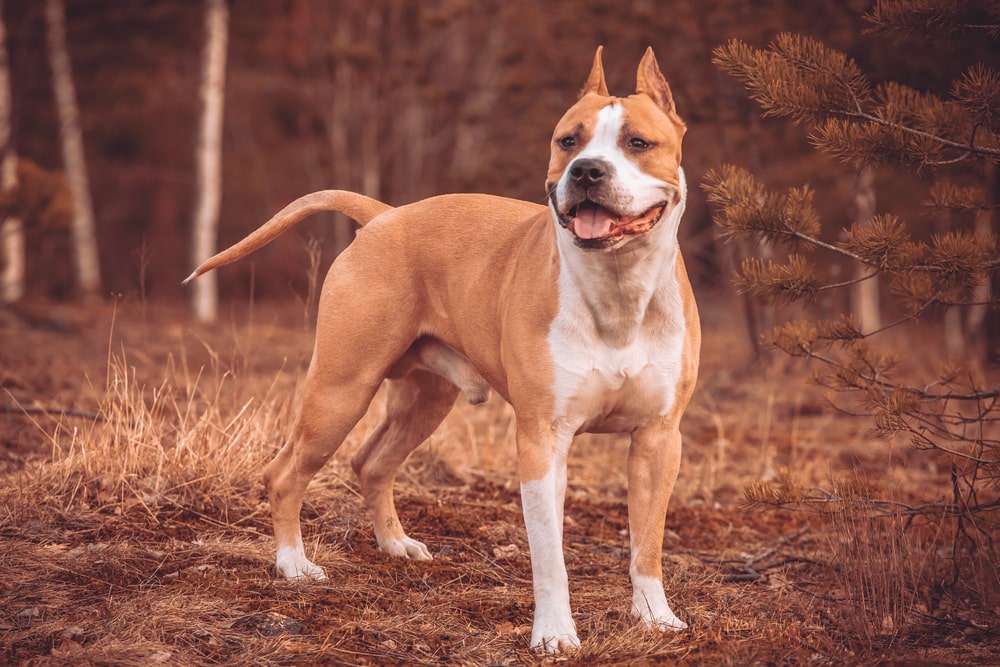
67. American Pit Bull Terrier
The American Pit Bull Terrier is known to be easy to train and makes a great family pet, becoming more popular in American households over the years. Contrary to belief, they aren’t as aggressive as some believe. While they have been known to be fighting dogs, they have also been known to be ‘nanny dogs.’ Just like any other dog, they are a product of their environment. If they are treated right, they will be the best dog you could ask for. They are great with children, are protective of their family and what they love, and are easy to please. Loyal and caring, these dogs are easy to care for.
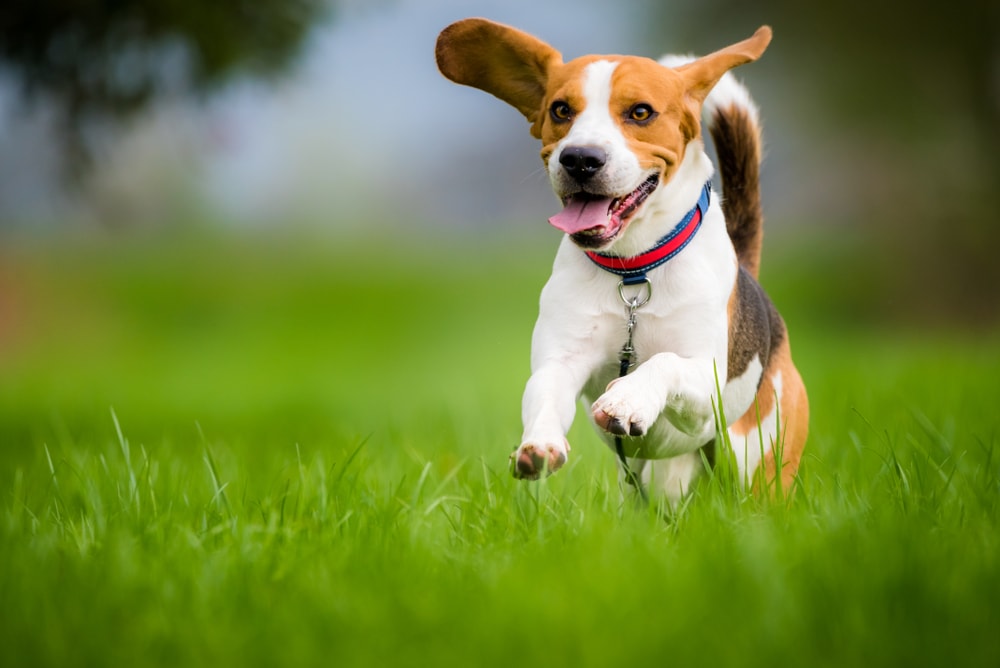
66. Beagle
Known for their great hunting skills and loyal companionship, Beagles are happy-go-lucky dogs with a lot to offer in their smaller size. With smooth, dense double coats that get heavier in the winter, you can expect them to shed like crazy in the spring and moderately throughout the rest of the year. It’s a good idea to brush them weekly with a medium bristle brush, a hound glove, a rubber grooming mitt, or a tool to remove the loose hair on them. This brushing will also help to promote new hair growth as well. Since Beagles are pack animals, they do well with human compatibility or with another canine. They are escape artists, so make sure they are in a fenced area with a height of at least 5 feet tall, with lots of space to run around, because they also need lots of exercise to run.
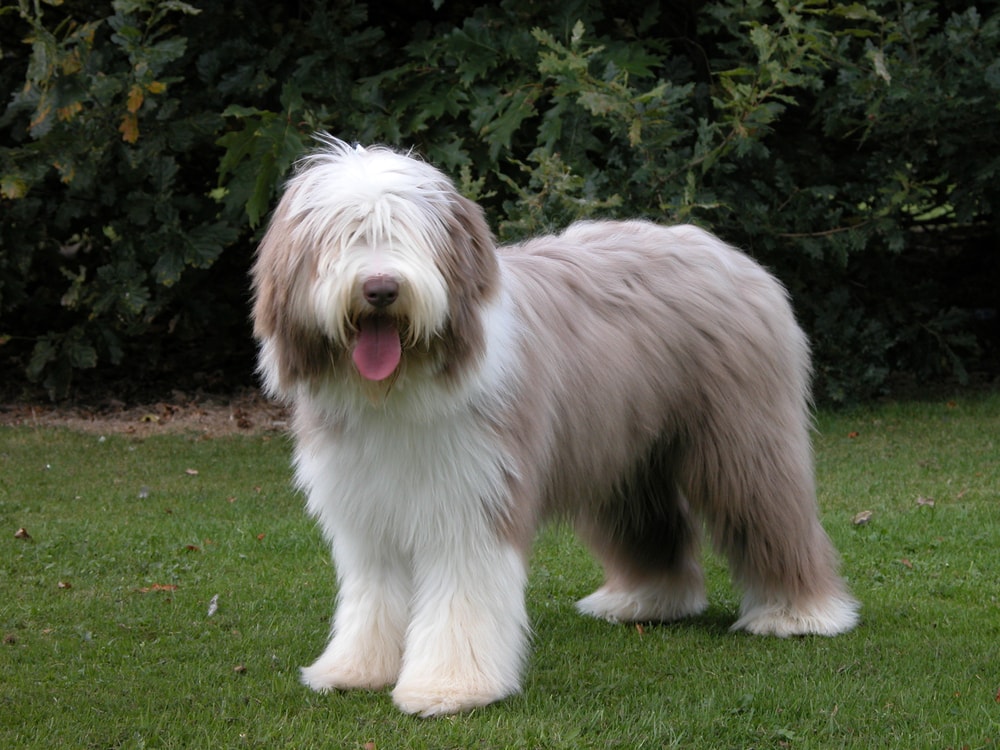
65. Bearded Collie
Bearded Collies are quite a charismatic and boisterous breed of dog. With a shaggy coat to keep them warm, these dogs love to exercise outdoors in all types of weather. Even with a face full of lavish hair, you can still see their characteristic expression, a dreamy and faraway gaze they are known to bear. These playful dogs can be a handful, but mostly, they are full of energy and heart and will bring laughter into your home. When it comes to grooming, there are two parts. The first is a daily brushing to remove foreign matter and tangles. The second part is a weekly session with a brush, comb, or pin rake and possibly an anti-tangle spray to remove dead hair and return the coat to its pristine condition.
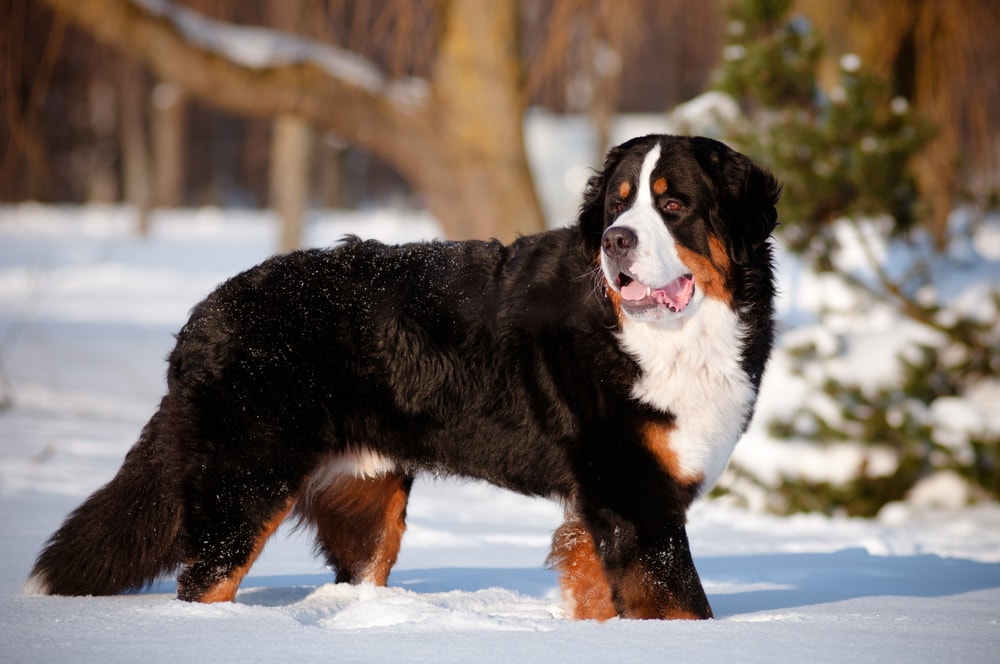
64. Bernese Mountain Dog
Bernese Mountain Dog is a hardy dog that thrives in cold weather climates. They are big and powerful dogs that are genetically built for hard work. Generally placid, they are also always up for a romp around the yard. They are sweet and affectionate, with a strikingly beautiful appearance to match. These beautiful dogs have thick, silky, and moderately long coats that are tri-colored in jet black, rust, and clear white. Their distinctive markings on their coats and faces are breed hallmarks when combined with the intelligent gleam in their dark eyes they all have. It just adds to their aura of majestic nobility. The Bernese Mountain Dog has a double coat, meaning it has a longer coat on the outside and a wooly coat underneath. They shed a fair amount, especially during shedding season, which occurs twice a year for them.
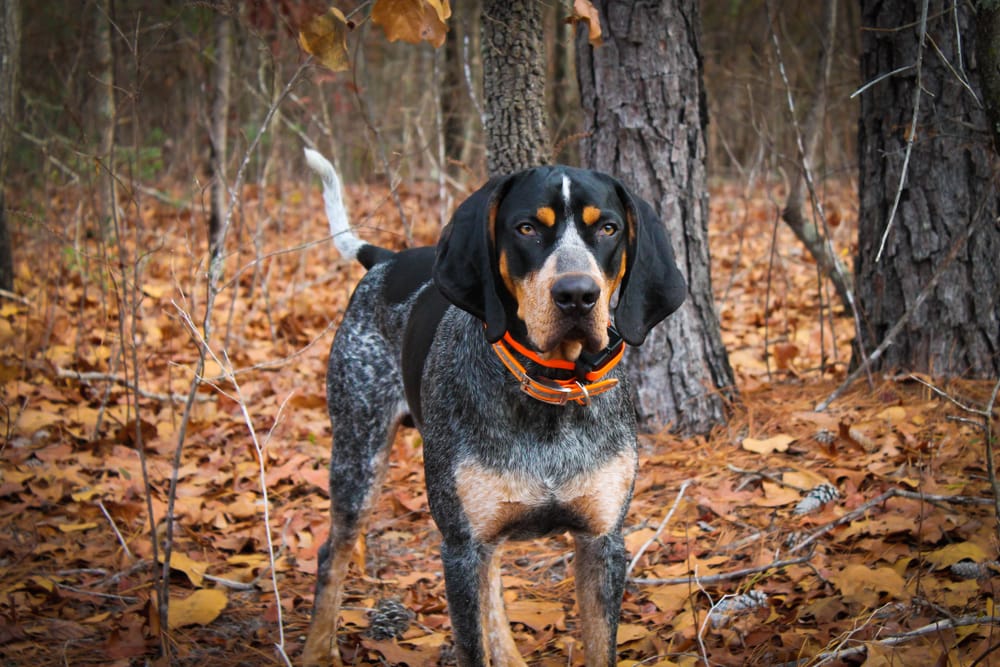
63. Bluetick Coonhound
The Bluetick Coonhound is a speedy and compact nocturnal hunter named for the mottled blue and black pattern of its glossy coat. They are well-muscled dogs but racy and sleek, never clumsy or chunky. This breed of dog craves affection and is deeply devoted to those who provide attention and love. This hound is also tremendously prey driven, so in addition to hunting and field trials, canine sports like agility and tracking are good outlets to channel the dog’s energy. Although they benefit from getting plenty of exercises, they also enjoy spending time snoozing at their owner’s feet, as well. Since this breed has a short and glossy coat that sheds moderately, weekly brushing will help to maintain a healthy coat.
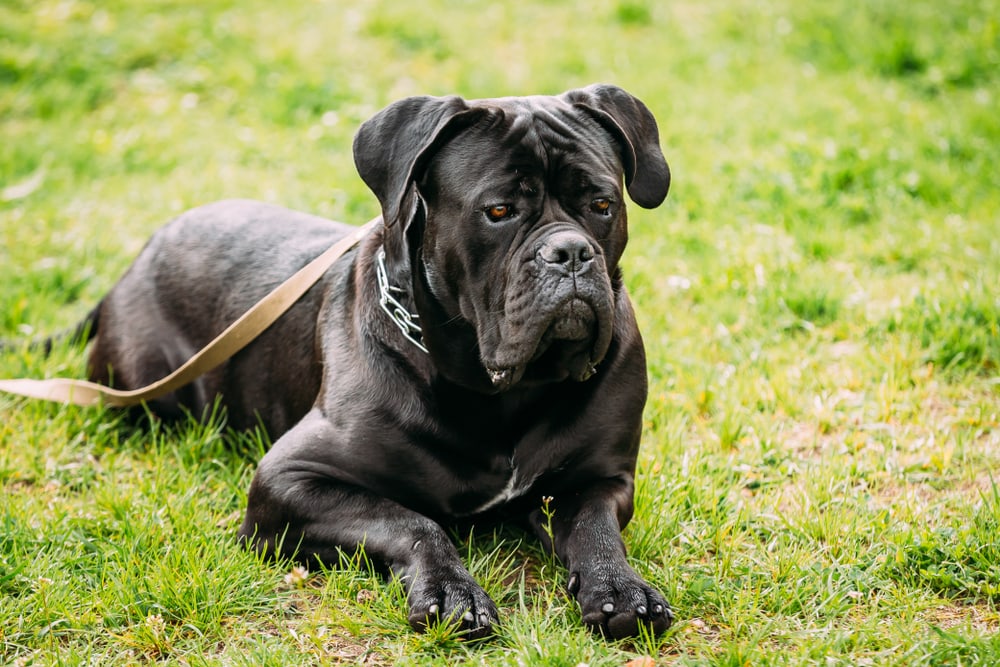
62. Cane Corso
The lineage of the Cane Corso goes back to ancient Roman times, and the breed’s name roughly translates from the Latin words’ bodyguard-dog.’ These trainable, smart, and noble-bearing dogs are assertive and confident, protecting what is theirs and showing their loyalty to their families. They are intelligent, versatile, intensely loyal to their humans, and eager to please. They are also willful and assertive. Cane Corso’s coats are short but double layered. The undercoat, varying in length depending on the dog’s climate, sheds throughout the year, especially in the spring. Weekly brushing is needed to help keep your furniture fur-free, as well as help remove dirt from the dog and promotes new hair growth. This breed needs serious exercise. Try a brisk walk or run of at least a mile in the morning and again in the evening. That will sustain their health and muscle tone.
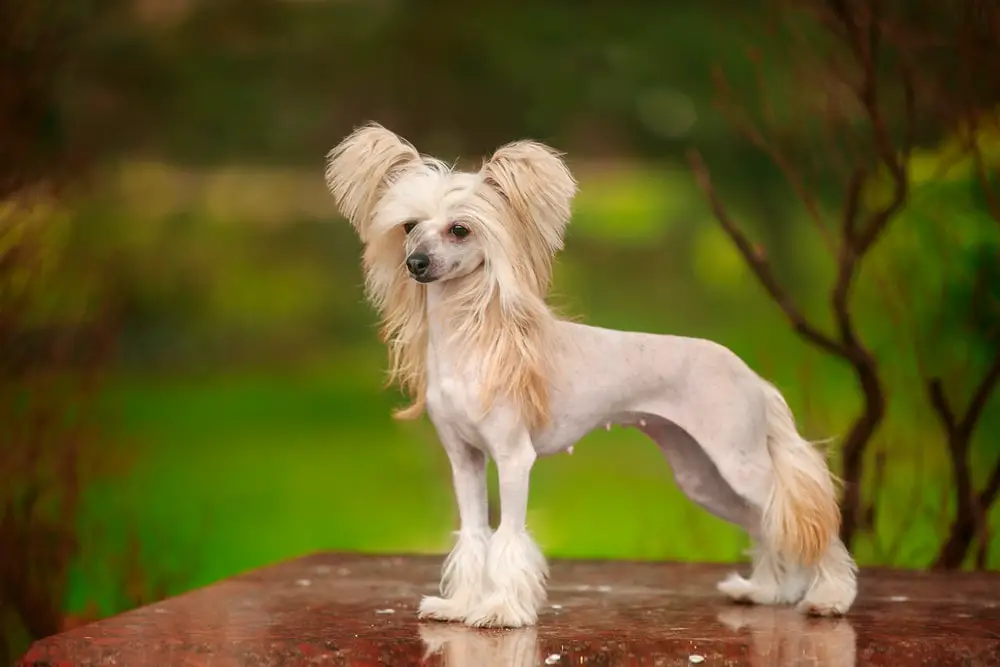
61. Chinese Crested
You can’t mistake Chinese Crested with any other type of dog breed, that’s for sure. With their spotted pink skin, spiky hairdo, fluffy “sock,” and feathery-looking tail, these dogs are sweet, lively, alert, frolicsome, and make ultra-affectionate companions for anyone. These dogs can either be hairless or coated. The hairless variety has smooth, soft skin with tufts of hair on the ankles, tail, and head. While the coated variety, called the Powderpuff, is covered by a soft, silky coat. Make sure to put sunscreen on your Chinese Crested when going outside, as you would yourself, to maintain healthy skin. The Powderpuff needs to be brushed daily to maintain a fluffy coat. Daily short walks with its owner and play sessions in the backyard are perfect for this little dog.
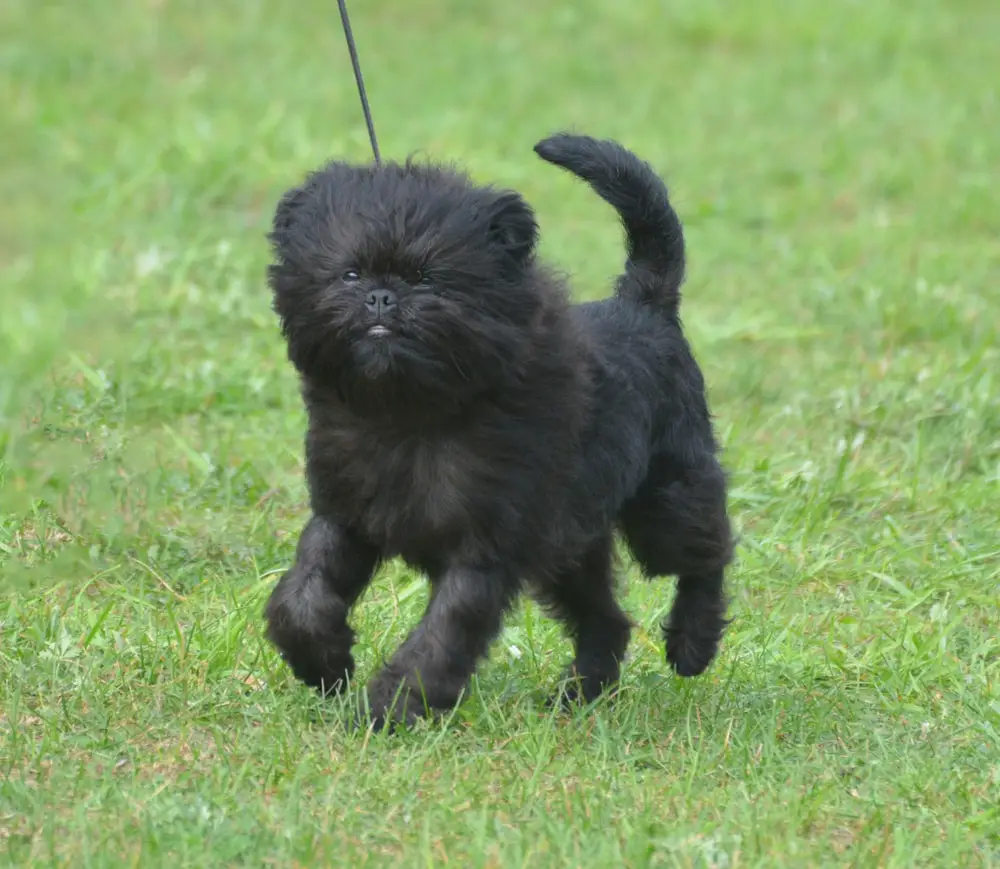
60. Affenpinscher
The Affenpinscher is quite the loyal, curious, and amusing dog around. This almost human-like toy dog is popular at dog shows and is fearless, despite its small size. This dog is known to be neat but shaggy in appearance, with a dense, harsh coat, and comes in several colors. Willful and domineering, Affen’s have a light and confident pace and are mostly affectionate and loyal. A serious look and confident stride to these smaller dogs makes it all the better and more entertaining when they are being silly.
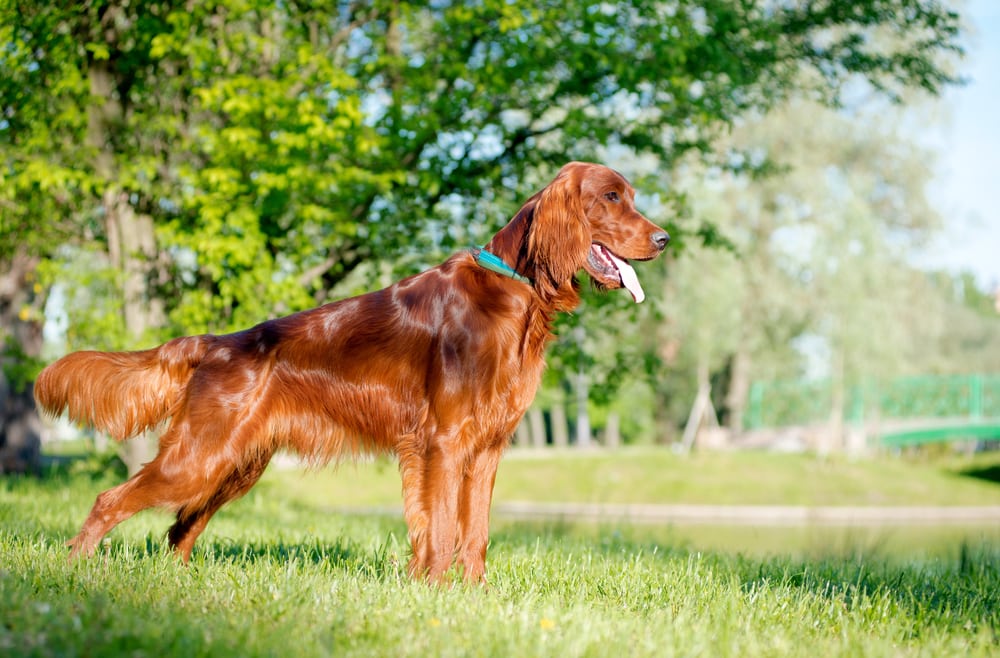
59. Irish Setter
A high-spirited gundog known for its swiftness, grace, and flashy red coat, the Irish Setter makes a great family dog with its sweet temperament and loyalty. These rambunctious redheads are like big kids at heart, but they are also very eager to please their humans and respond great to patient and positive training. Their stunning coats require moderate grooming, which includes being brushed at least twice a week. The Irish Setter is a sporting breed, and like most sporting breeds, they need plenty of daily exercises. This can come from long walks and play sessions in the yard.
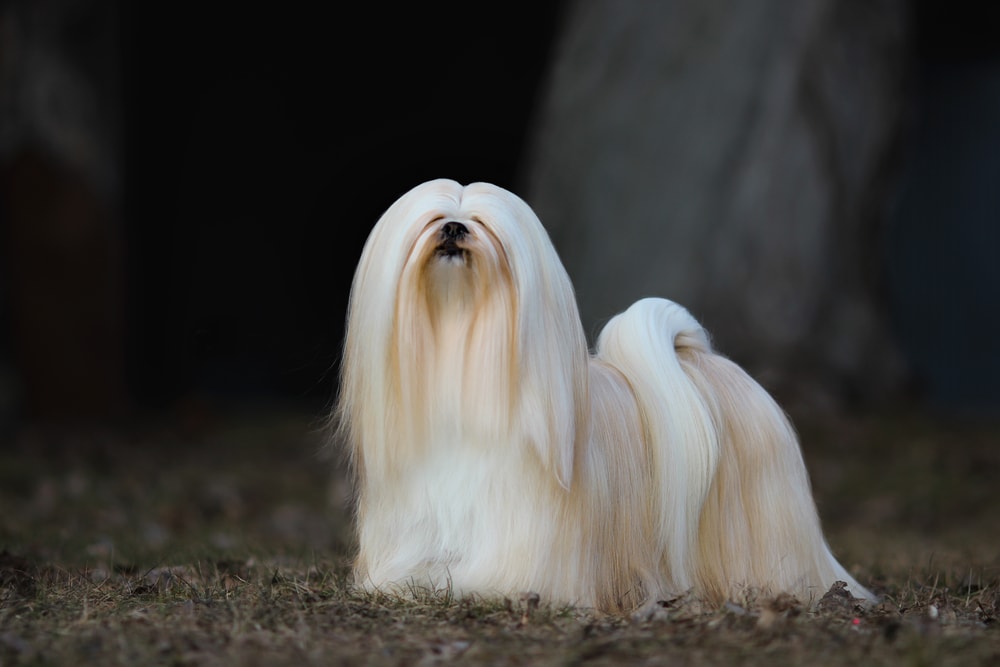
58. Lhasa Apso
Although smart, confident, and complex, Lhasa Apsos are family comedians but regally aloof regarding strangers. They are known for their floor-length, flat hanging coat, which is parted in the middle and draped down each side of their body, with a feathery tail that curls over the back in a distinct manner of Tibetan breeds. Whether it has long hair or a puppy cut, this breed requires regular maintenance. They need to be brushed regularly and bathed every two weeks if it sports a longer coat. Also, be sure to brush its fur at least once between baths. When it comes to exercising, Lhasa is generally not a couch potato. They will race around the house or apartment to burn off energy and entertain themselves when in a fenced yard. They also love to go on brisk walks with their owners.
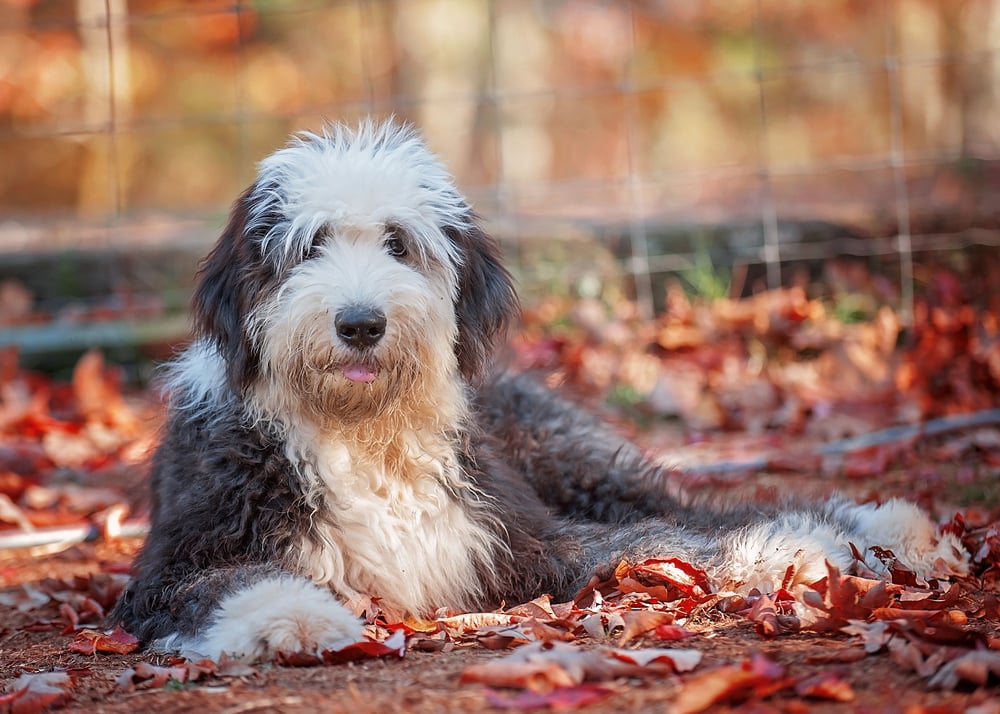
57. Old English Sheepdog
A big and agile dog who enjoys exploring and romping through the woods, the Old English Sheepdog is the archetypical shaggy dog. Famous for its profuse coat and peek-a-boo hairdo, that distinctive bear-like gait, and mellow, agreeable nature, this dog makes a great family companion. As expected, this breed requires a lot of grooming time. Their double coats require grooming right down to their skin, over their entire body, at least once weekly to maintain their full coats. Old English Sheepdogs don’t need an abundance of exercise, and a daily walk will suffice for these dogs. Most of these dogs are quite intelligent, and they tend not to forget something after they learn something. They get bored with repetitive and robotic training exercises, so if you want to participate in some of those activities, make sure to change things up and make it new and fun for them.
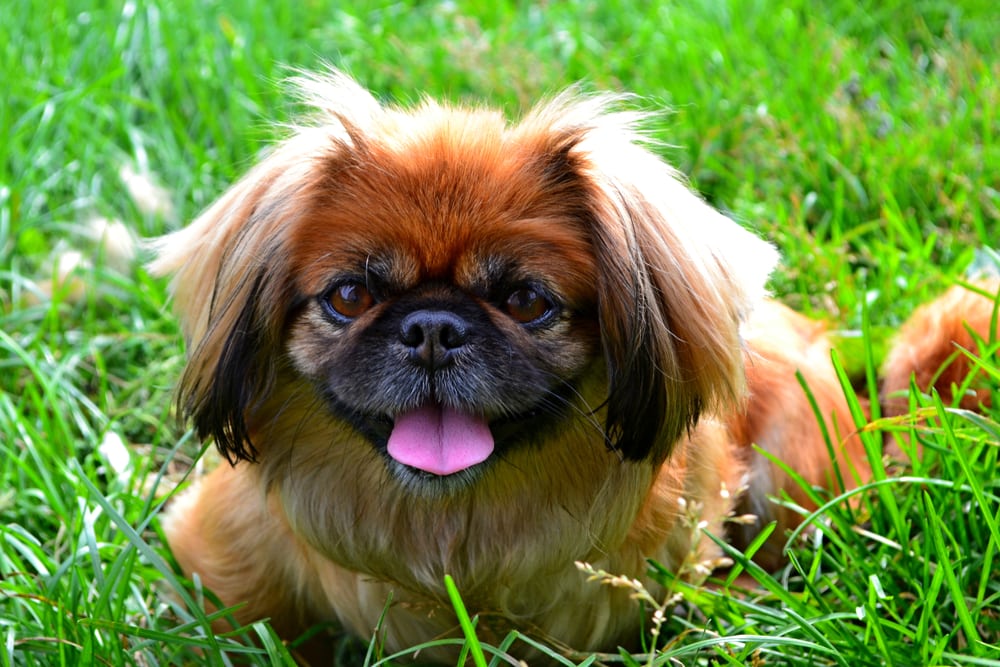
56. Pekingese
A compact toy companion of regal bearing with a distinctive rolling gait, the Pekingese is one of several breeds created for the ruling classes of ancient China. These dogs are sophisticated with undying loyalty and are compact and stocky toy dogs. These dogs are charming and confident companions who develop a tight bond with their favorite humans. Their coat is longest at the neck and shoulders, giving them their famous ‘lion’s mane.’ With a thick double coat like the one they have, the Pekingese breed requires a good amount of maintenance. They shed seasonally, show brushing them at least once a week for an hour at a time will help to remove loose hairs and prevent matting. An occasional bath will also help with keeping your pooch looking its best.
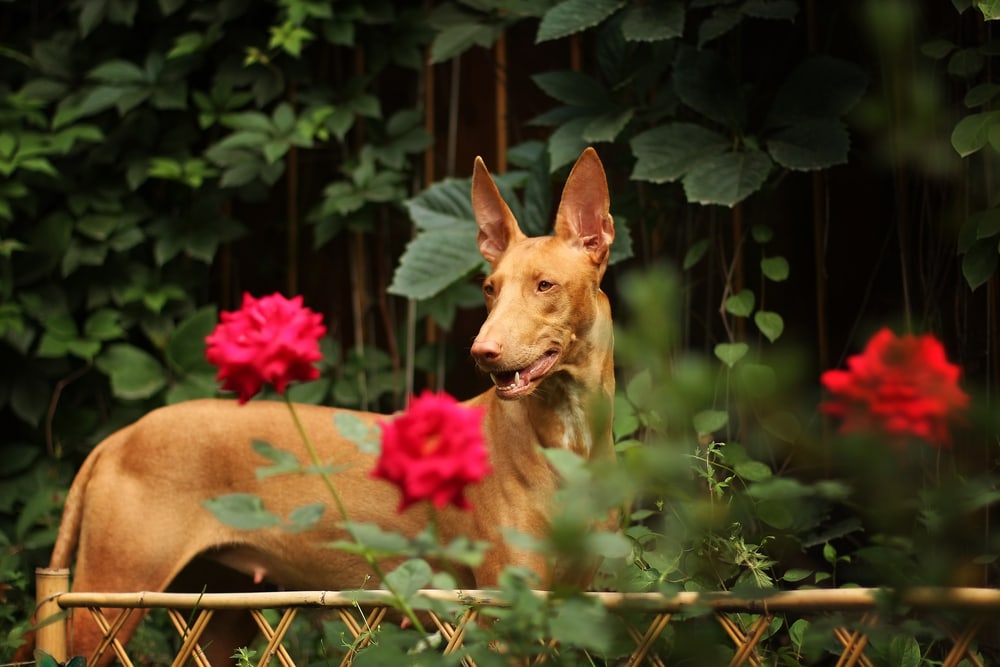
55. Pharaoh Hound
The Pharaoh Hound is an elegant but rugged sprinting hound that has been bred to course small game over punishing terrain. These friendly and affectionate hounds settle down nicely at home, although they are quick and tenacious when on a scent. These dogs have several distinguishing traits, including their tight tan coats with matching leather on their ears, nose, and eye rims, ravishing amber eyes, and the white tips on their tails. What’s even more impressive about their appearances is that they can smile and have a unique way of smiling when they are happy or excited. These dogs require a lot of exercise, whether on a leash or in a high-fenced-in yard. They should never be off leash if they are not behind a fence.
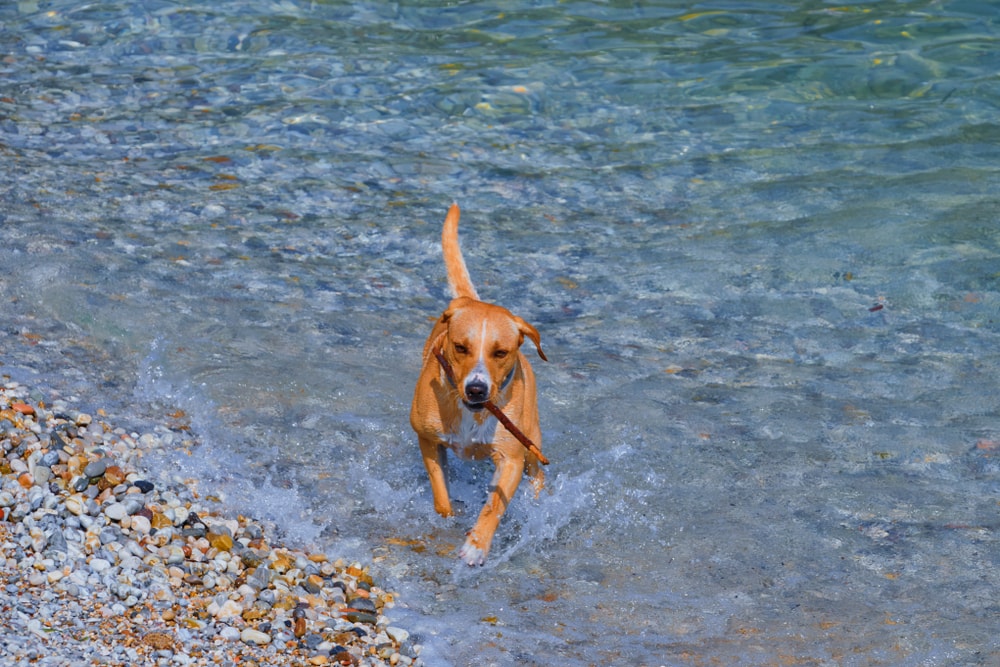
54. Redbone Coonhound
Although even-tempered and mellow, the Redbone Coonhound is a tiger on the trail. Vigorous activities like swimming and hunting between rest periods are what these coonhounds live for. Fast, surefooted, moving with a proud and determined gait, this dog was bred to work on all kinds of punishing terrain. This dog makes a wonderful companion for someone who is an active biker, hiker, or runner. They need a lot of physical activity to stay happy and healthy.
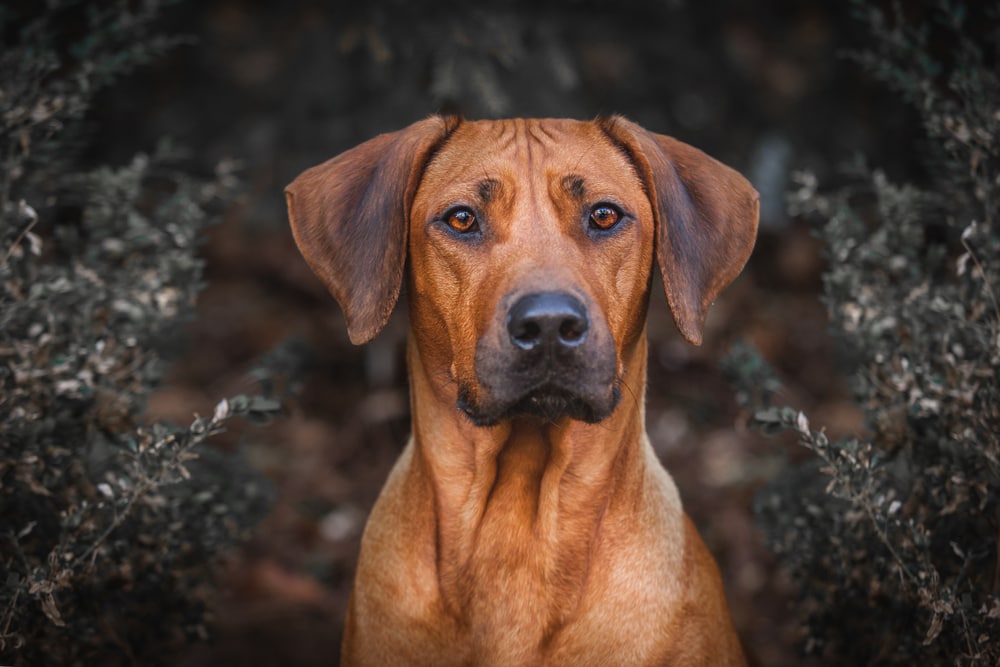
53. Rhodesian Ridgeback
An all-purpose ‘Renaissance hound’ whose hallmark is the ridge, or stripe hair growing backward, on his back, the Rhodesian Ridgeback is a fast and powerful athlete of a dog. They only come in one color, wheaten, which does so in every shade seen in a wheat field, from pale flaxen to the burnished red of a maturing crop. They also have two nose colors, black and the less commonly seen color brown. This breed must be guided with a firm but fair hand starting from puppyhood. The Ridgeback is independent, strong-willed, domineering, protective, affectionate, faithful, and loyal to those they trust. They need physical activity to help keep them healthy and happy, so daily outings such as long walks and play sessions with their owners are a great way to burn off steam.
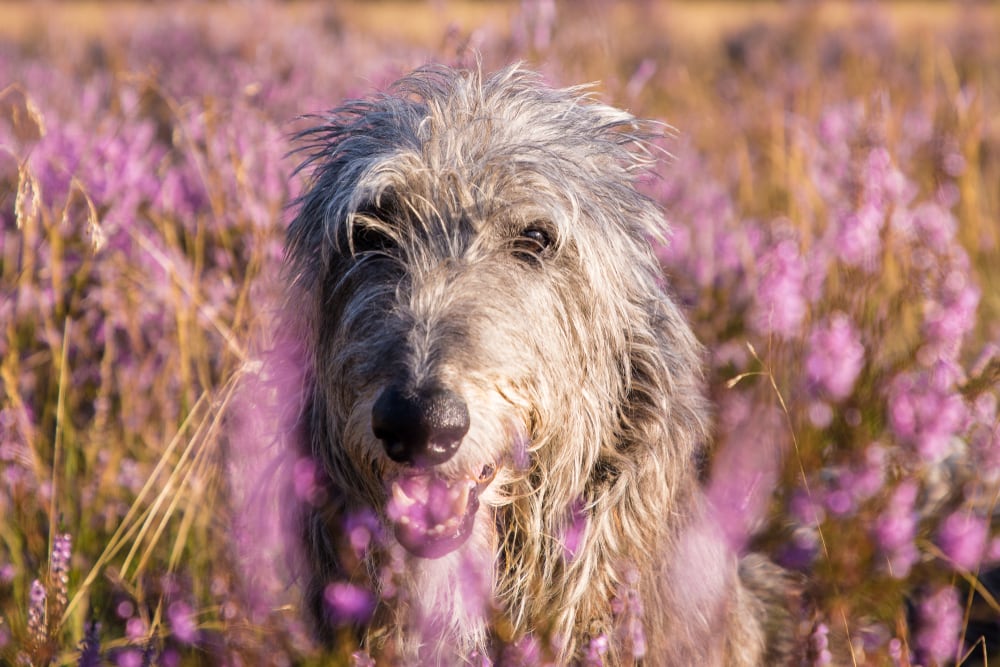
52. Scottish Deerhound
The Scottish Deerhound is a majestically large coursing hound that has been struck from the ancient Greyhound template. Among the tallest of dog breeds to exist, the Deerhound was originally bred to stalk giant wild red deer in Scotland. Its harsh, somewhat wiry coat is very easy to care for, only requiring it to be brushed all over and combed once a week or so. It will also need its nails trimmed every few weeks if they aren’t naturally worn down. Deerhound puppies are difficult to raise to their potential without a companion playmate and a large, securely fenced play area, so make sure you have both before adopting this breed of dog.
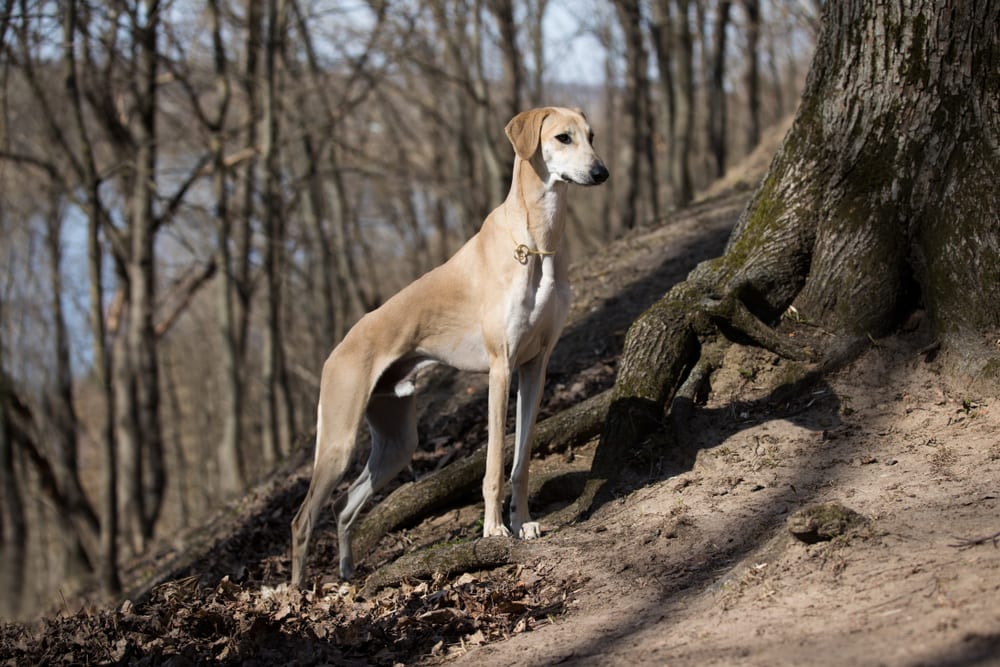
51. Sloughi
Nicknamed the ‘Arabian Greyhound,’ the Sloughi is a lean and swift coursing hound who hunted a variety of game in North African deserts. A classic sighthound, this dog is regally aloof when it comes to strangers and is gentle with loved ones. Its smooth, short, and fine coat require very little maintenance, and weekly brushing should keep its coat smooth and sleek. An occasional bath can also help to keep the hound smelling clean. Although this dog is quiet and calm in the household, Sloughis need ample exercise, including opportunities to run at full speed in the safety of an enclosed area. This breed is intelligent but shy, so they do best with caring and sensitive owners. When training, they do not respond well to hard training methods.
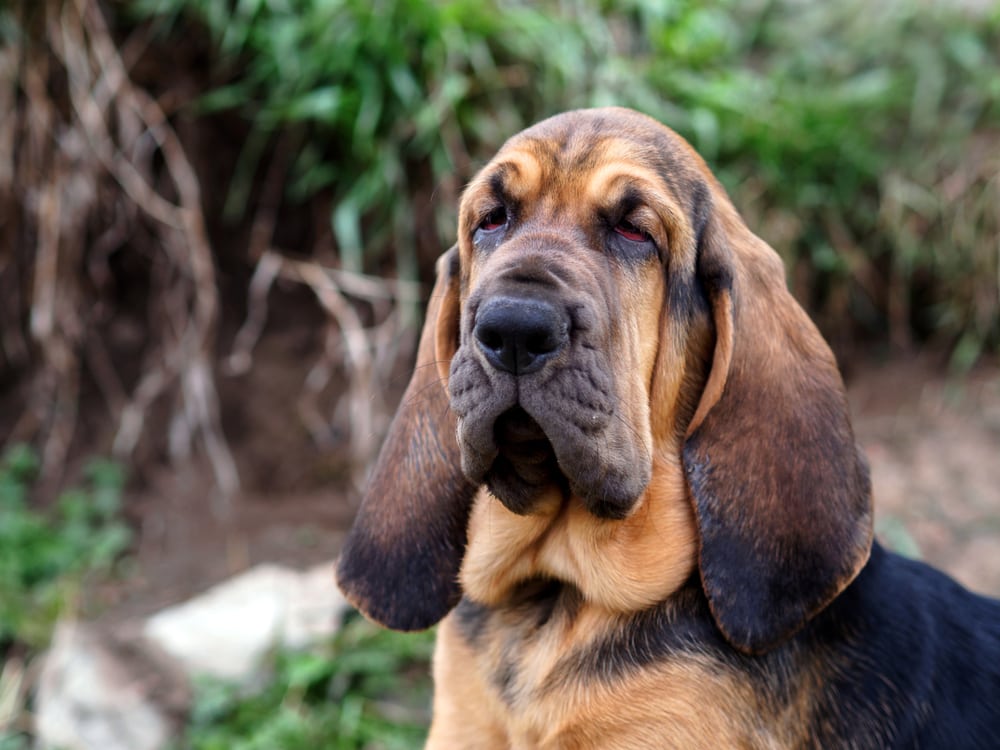
50. Bloodhound
The Bloodhound is quite a distinctive-looking breed, with its long ears and saggy face. It was originally bred as a hunting dog because of its wonderful sense of smell. It would find the scent of prey and then track it to the ends of the world. That means that this breed requires a lot of exercise. That means that couch potatoes shouldn’t consider this breed to keep at home if they’re not willing to put in the work to keep this dog active. In fact, you’ll have more trouble trying to stop your Bloodhound from destroying your couch if there’s so much as a crumb of food between the cushions.
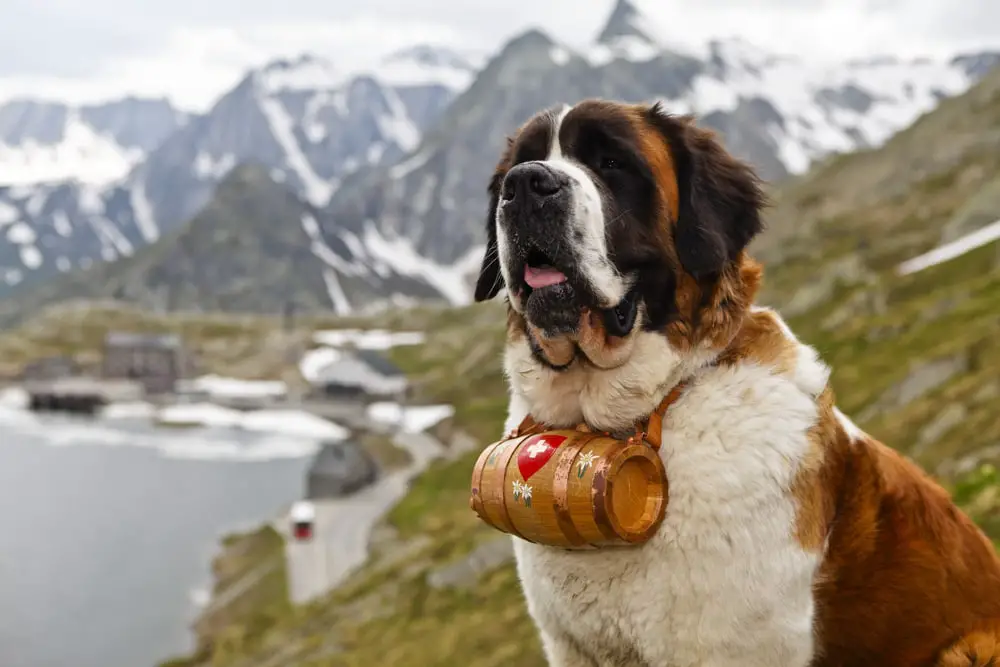
49. Saint Bernard
Almost everyone alive in the 90s can recall the movie “Beethoven,” which starred the massive Saint Bernard. They’re a large dog breed and have a lot of drool and long fur. However, people originally bred Saint Bernards to be working dogs to rescue people from avalanches. They have a great sense of smell and are very social dogs who care about people, making them great family dogs and great protectors. However, because the breed comes from the Swiss Alps, they are very sensitive to heat and shouldn’t be left outside in the summer heat.
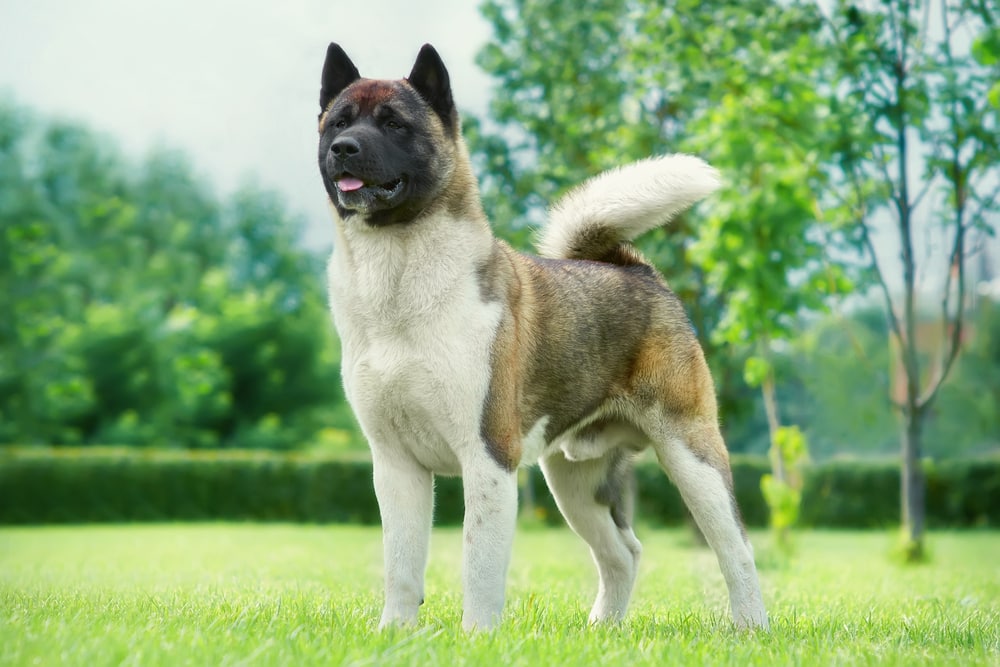
48. Akita
Akitas have been confused for Shiba Inus recently, and that’s because they are both breeds from Japan. They also have similar face shapes and ears, but they’re still very different from each other. Akitas are pretty stocky and are much larger because they were bred to hunt bears. They do tend to roam, so you should never leave them in a yard unattended as they will run off independently. They’re also fierce protectors, so that’s not something you need to train them to do. But they’re also independent dogs, so you may have a hard time getting one to listen to you.
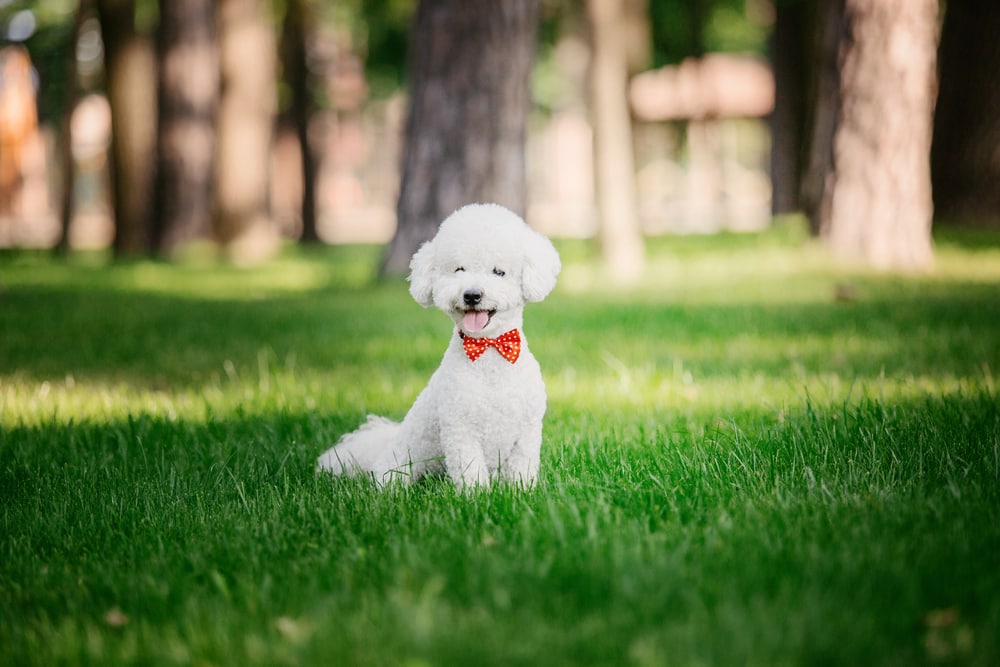
47. Bichon Frise
People mistake the Bichon Frise for being nothing more than a small toy dog, but the breed is actually much more than that. They’re known to be relatively affectionate and intelligent, easy to train, and extremely playful. They only come with white fur coats, so if you keep one outside, they’re going to look dirty pretty quickly. They make great pets for those who don’t want to do much brushing since they don’t shed a lot, but they do require maintenance in order to keep their coats looking good. However, other than that, they’re pretty social animals who love people.
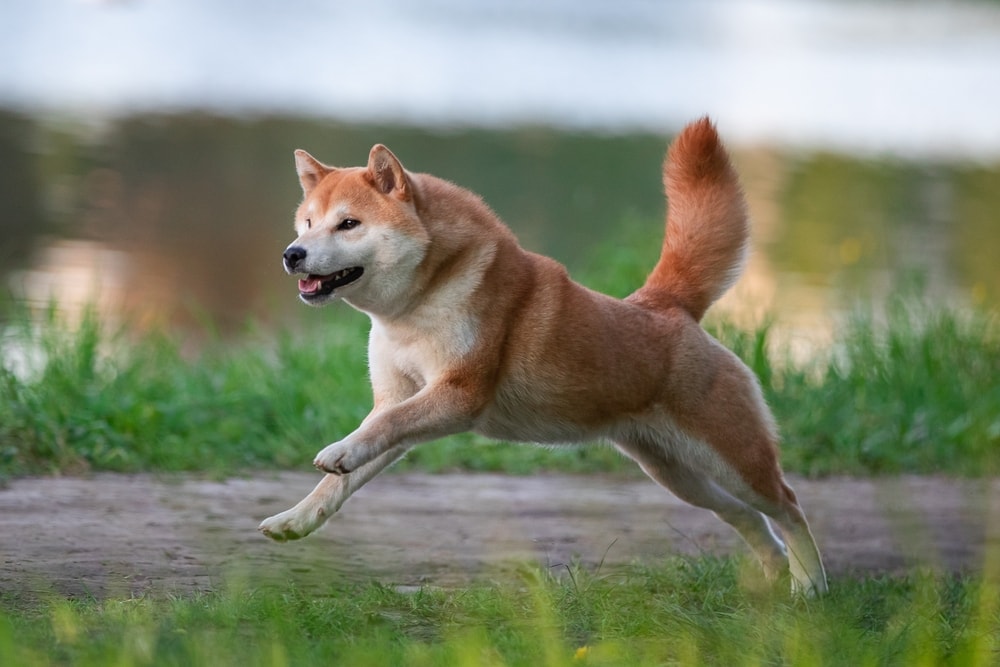
46. Shiba Inu
The Shiba Inu has gained popularity recently due to certain Internet memes. Nowadays, everyone is looking to get a Shiba Inu in their home because of their adorable appearance. However, they are quite vocal dogs and can be stubborn if you don’t train them correctly. These dogs are relatively sturdy and muscular, which means they have much power behind their pull. However, if you don’t like much shedding, this breed is not for you. They have a thick double coat that sheds twice a year, so you have to do a lot of brushing to keep it off your furniture.
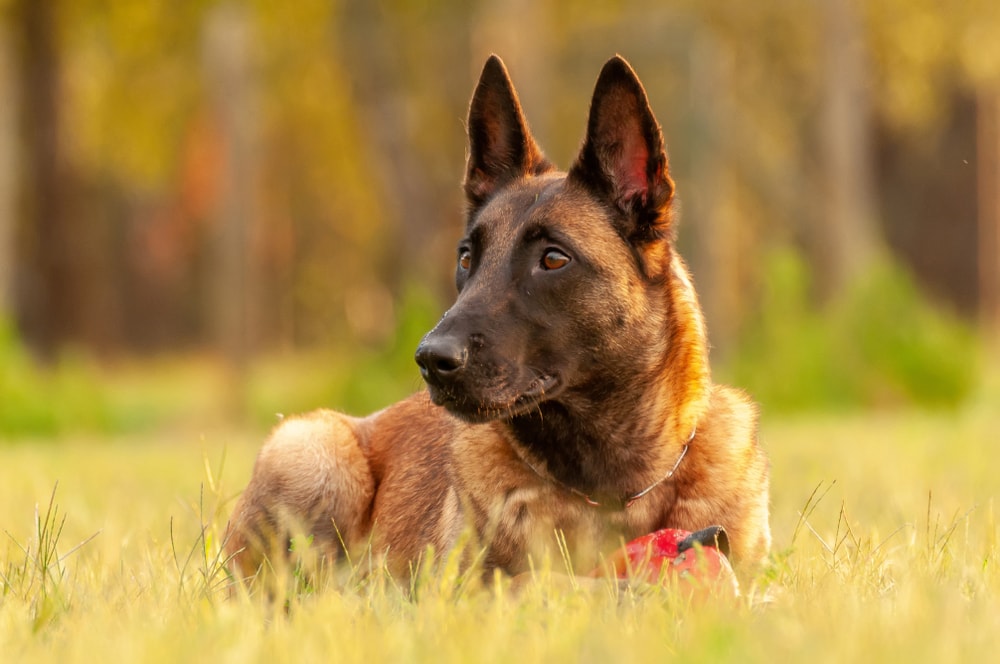
45. Belgian Malinois
The Belgian Malinois has often been confused for a German Shepherd, but they aren’t the same breed at all. They are brilliant and obedient and can be pretty easy to train if you have a strong temperament and are confident. By instinct, these dogs are protective of their owners and are suspicious of people they don’t know. Because they’re mainly trained to be security and police dogs, they require daily exercise and activities that challenge their minds daily. Without these challenges, they can become destructive around the home and won’t hesitate to chew up anything they can sink their teeth into.
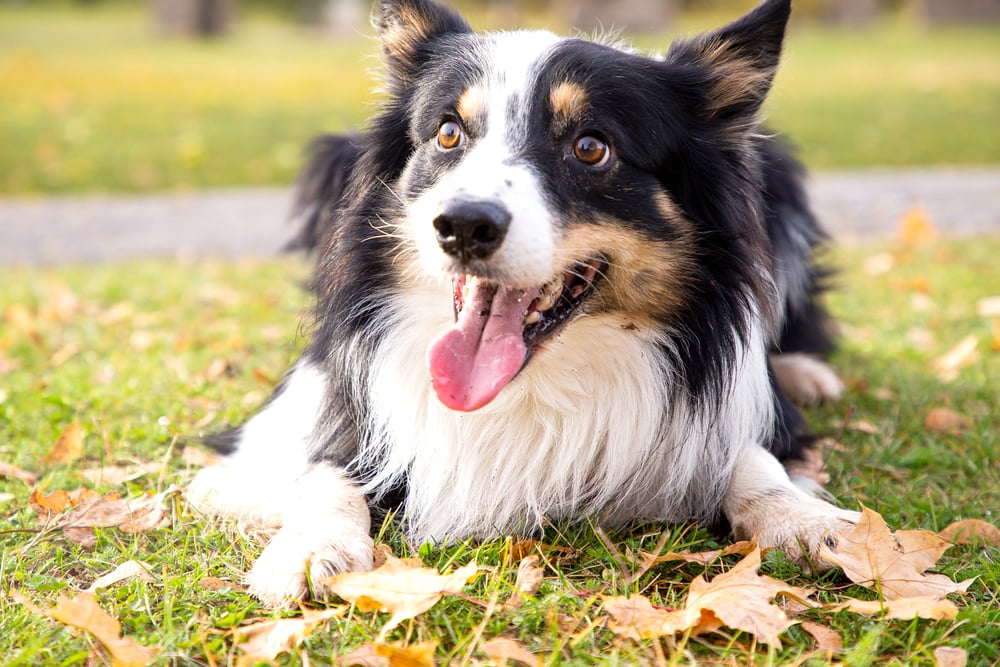
44. Collie
Everyone knows the famous Collie Lassie, and during that time period, it led to a surge of people searching for this breed to add to their homes. For this reason, many collies were overbred at that time. In turn, it increased the health problems that continue to this day. The collie comes in both the rough and smooth coats, and they are a wide variety of colors as well, including tricolor and blue merle, just to name a few. Originally bred to be herding dogs, they make excellent dogs around children because of their gentle dispositions and the need for companionship.
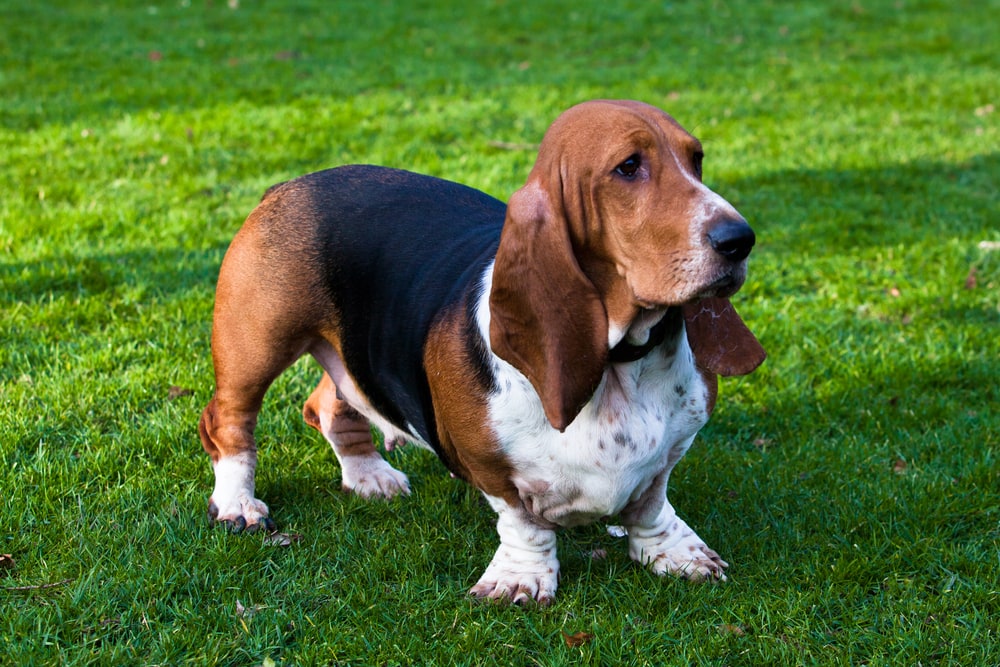
43. Basset Hound
The Basset Hound is taken very seriously, probably because of their dopey appearance, but they were actually bred to be hunting dogs. People used them for hunting rabbits, and their body shape allowed them to get down into their burrows to root them out. Otherwise, they’re pretty laidback dogs when they’re not hunting. They can be pretty affectionate with people and would be more interested in sniffing new visitors into your home than barking at them. If you bring this breed home, though, it would be best not to have a lot of carpeting since they’re prone to much drooling.
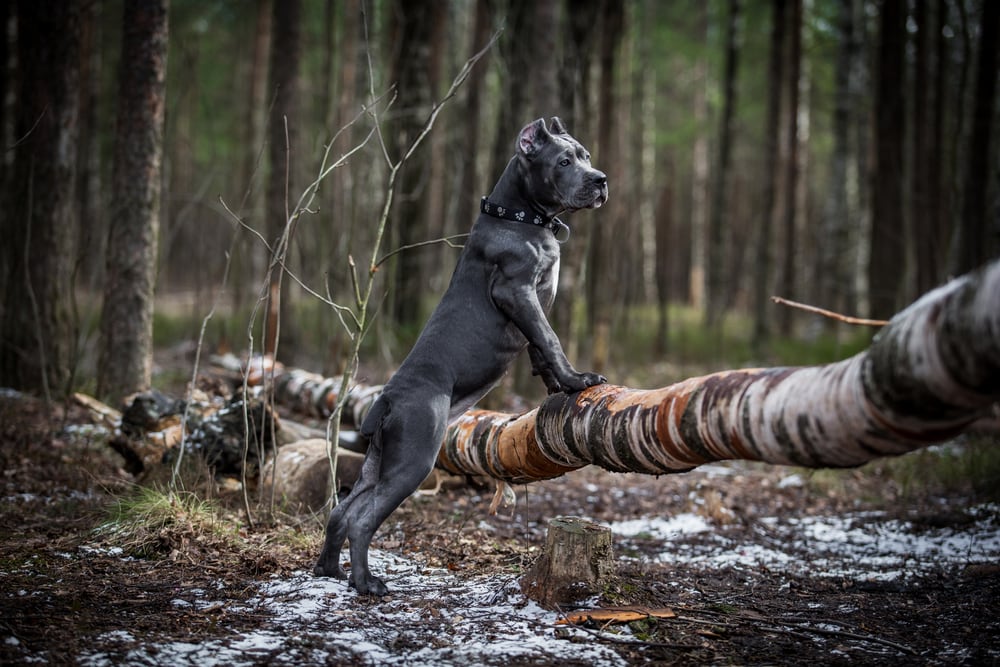
42. Cane Corso
The Cane Corso is a pretty large dog originally bred in Italy to hunt large animals and provide security to property. They’re incredibly athletic and require much exercise to tire them out by the end of the day. Lots of walks, playing frisbee, and providing them with puzzling toys are all ways to keep them engaged, or else they might resort to destructive behavior. Despite being a pure breed, you might be surprised to see how many of these dogs end up in shelters and have been confused with Pitbulls.
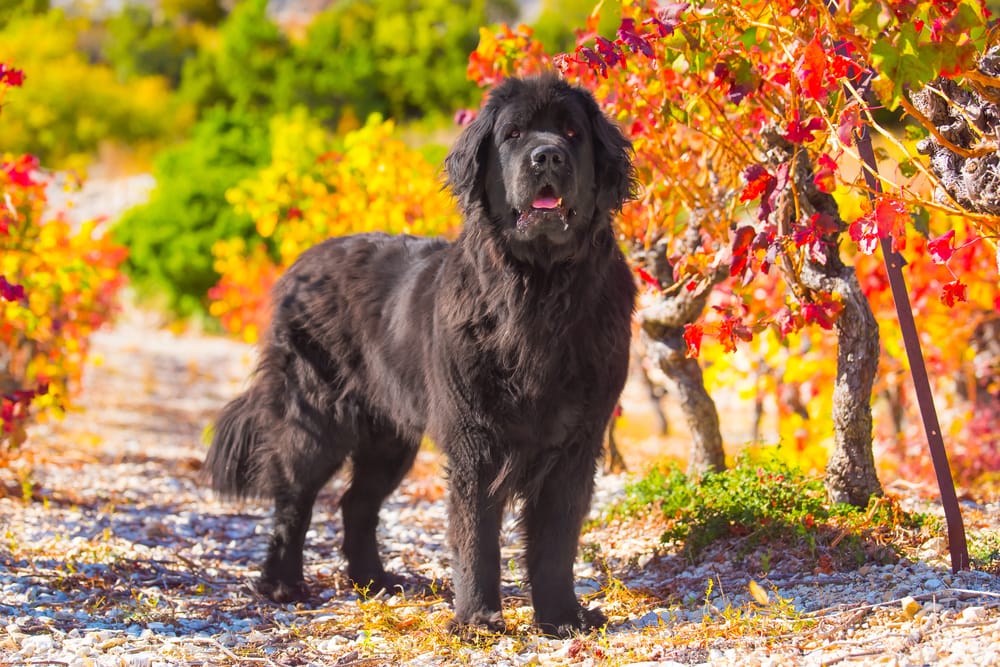
41. Newfoundland
The Newfoundland, called the Newfie for short, is quite a large dog, so it’s not the best dog to have if you live in small spaces. They were bred as working dogs to help fishers with their nets and haul wood from the forests. They’re pretty good at swimming, so if you’re ever keen on going to the beach, you might have difficulty keeping this breed out of the water. They make a great family companion, they’re easy to train, and they are pretty friendly towards strangers too. Though not a guard dog by nature, their size would be more of a deterrent to any intruder.
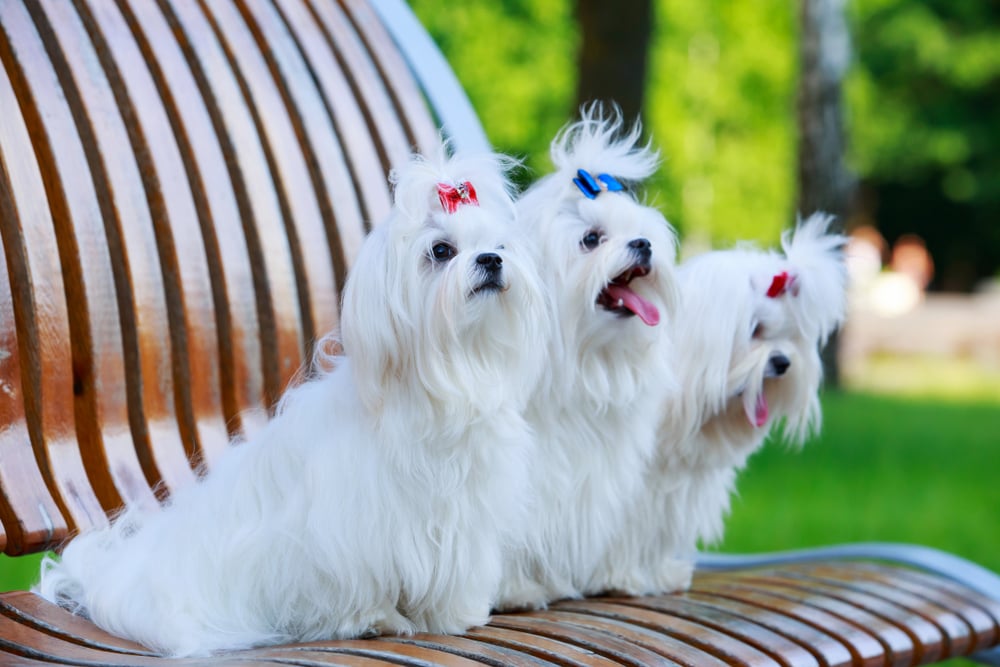
40. Maltese
The Maltese is a dog breed born from the lap of luxury. They have been around since before the Bible. They have a marvelous coat that makes them look like a work of art, but much care is required to keep them looking this good. Thankfully, they don’t shed a lot, but most people prefer to keep them with short coats so that they’re not collecting dust and dirt from every surface they walk on. They can be quite affectionate and make excellent alert watchdogs as well. Fearless by nature, they have no problems taking on the challenges of an agility course.
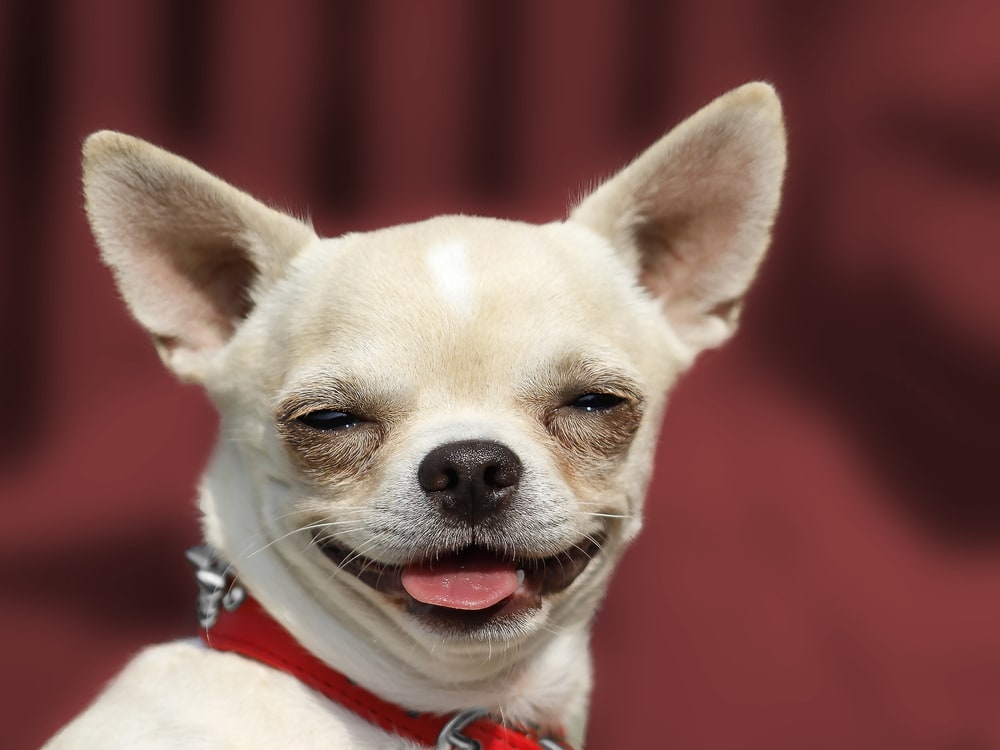
39. Chihuahua
When people look at a chihuahua, they likely think about a small dog that is always angry. Nevertheless, there is more to this breed than people give them credit for. They’re incredibly loyal, so you have a friend for life, and they tend to love anyone they meet. Unfortunately, most people carry them around because of their size, which can give these dogs a complex. They simply love the attention to the point that they’ll do absolutely anything to get it, including tricks or simply pushing their way into your lap. They can live a long time, but they’re prone to many health ailments, such as eye infections and bronchitis.
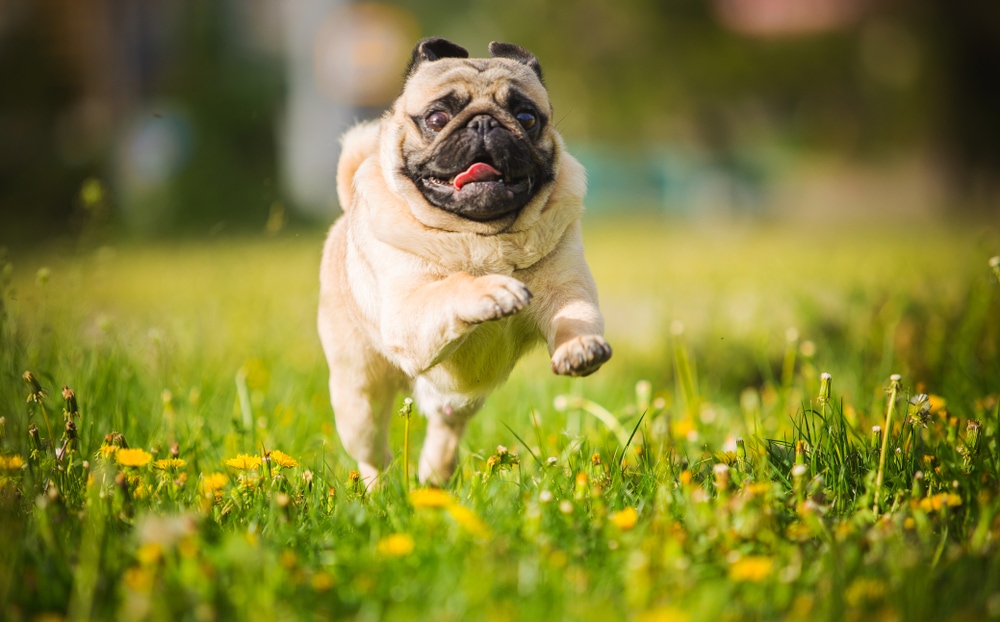
38. Pug
Pugs recently gained much attention in the 2000s, making them one of the more popular breeds in recent years. Despite having short hair, they’re actually pretty heavy shedders, so they need to be groomed regularly to keep this hair off your floors. Although their smooshed faces can appear adorable, this characteristic is also attached to many health problems, like overheating and breathing problems that can shorten the breed’s lifespan. Because of their size and how easy it is to train them, they make great apartment dogs who revel in the attention.
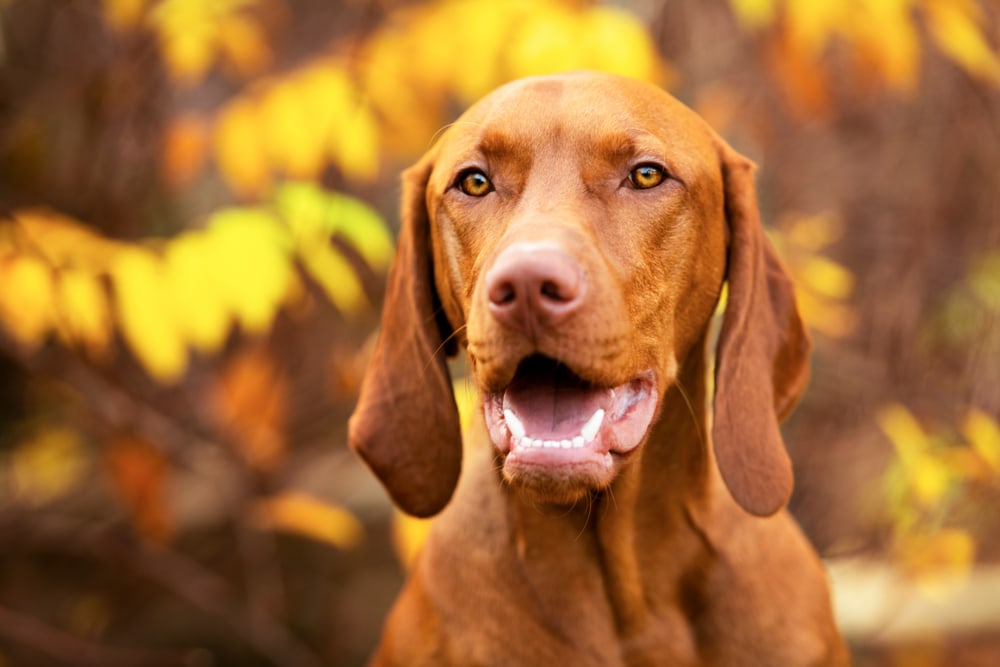
37. Vizsla
Not many people have heard of the Vizsla breed, and they’re easily mistaken for other breeds out there, but it really stands out on its own. Originally bred in Hungary back in the 9th Century, people used them as hunting dogs. They require a lot of exercises, but once they’ve found their human, they’re attached to them for life. Their loyalty knows no bounds to the point that they’ll be stuck to your side like Velcro forever. However, this loyalty can also lead to extreme separation anxiety unless they’re properly socialized. Their hunting dog nature requires many exercises, so be prepared for many walks and activities throughout the week.
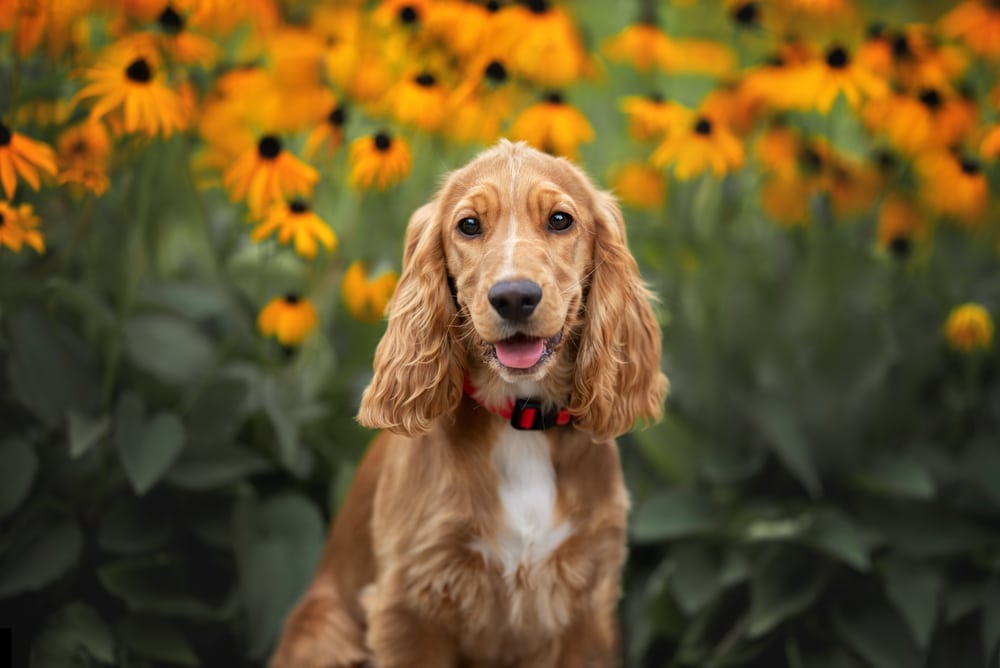
36. Cocker Spaniel
If you’re looking for a dog breed that is both adorable and cuddly, then the cocker spaniel might just be the breed for you. Cocker spaniels are a great-looking breed with a personality that would win over anyone’s heart with how playful they are. They’re eager to please too, so they’re likely to listen to any commands you teach them. However, be sure you have several brushes because they require a lot of grooming to keep their coat looking its best. They are avid barkers, but with a bit of discipline, you could keep this to a minimum.
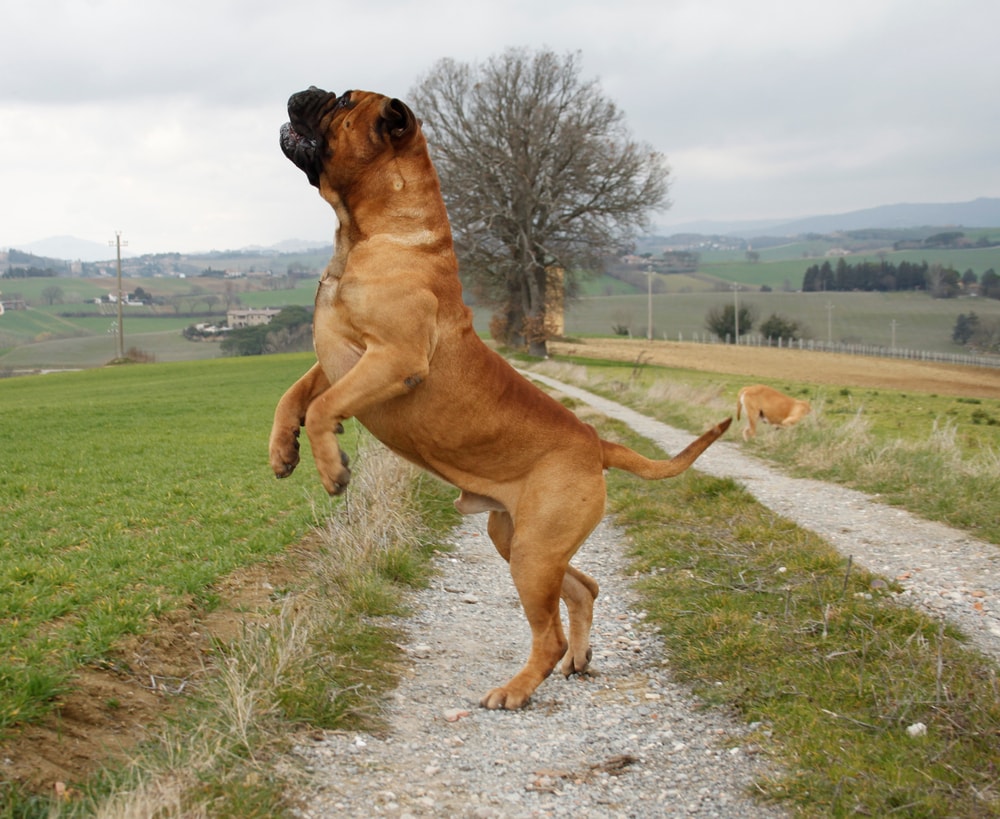
35. Bullmastiff
The Bullmastiff can look intimidating, and for excellent reasons. They’re not afraid of anything and will get in the middle of danger to ensure that their family is safe. When they’re not guarding their home they’re pretty happy to be lapdogs, lounging on the couch with you while watching television. Because of this gentle side of their nature, they also make relatively good therapy dogs for those who need a little more help throughout their days. Unfortunately, the Bullmastiff is not a fan of other dogs and prefers to be the only dog in the home.
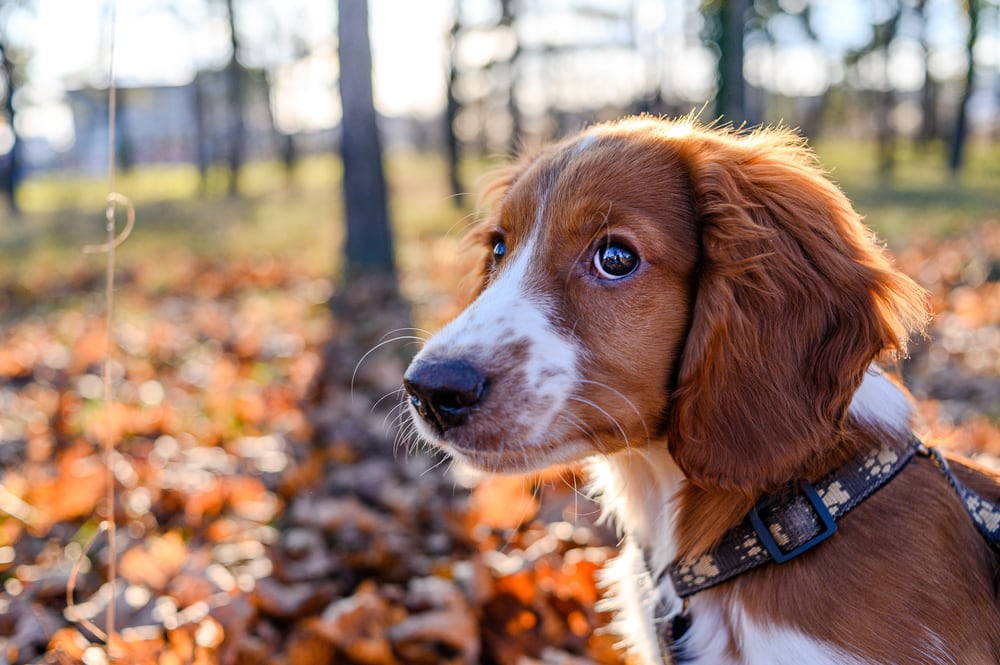
34. Welsh Springer Spaniel
The Welsh Springer Spaniel makes an excellent retriever, so if you’re an avid hunter, this is the breed for you. They also make a pretty good watchdog for the home but are still a gentle companion for the younger members of your family. He’s the perfect size not to crush small children but also big enough that they won’t get pushed around by older ones. The spaniels get along with most other pets, so they work well in a home with other animals. They do tend to have a stubborn streak. So consistent training is critical.
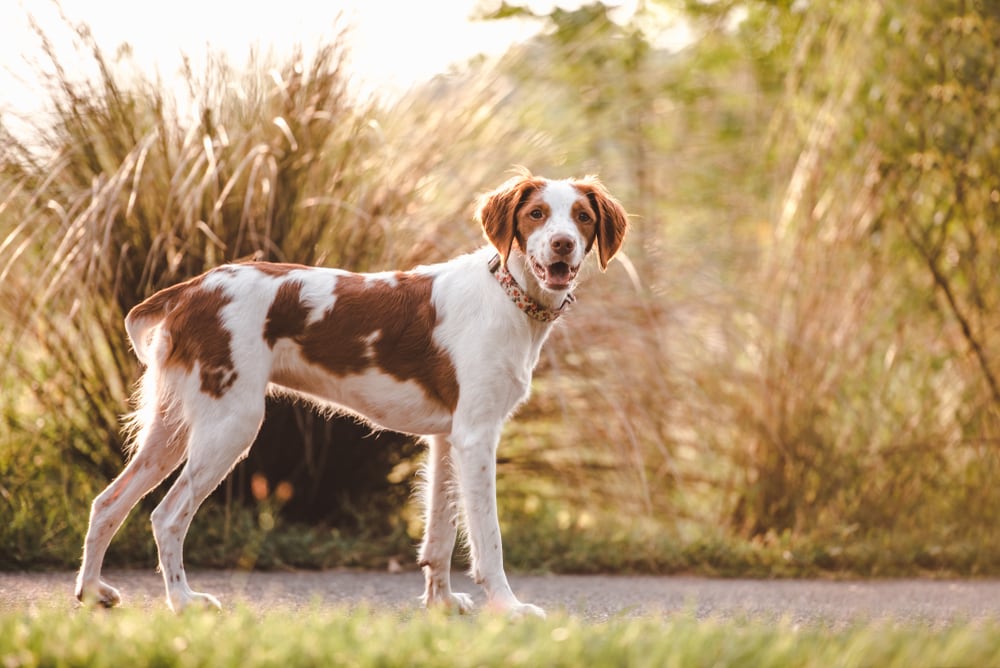
33. Brittany
Brittanys have nothing to do with the girl’s name; instead, they came from a region of France called Bretagne. People bred them as hunting dogs and pointers so that hunters could find the animals that they shot. This means that this breed tends to have a high prey drive, so it’s best not to get one if you have smaller animals in your home. They also have a lot of energy, so exercise is crucial. Despite being medium-sized dogs, they’re not great at apartment living because they need a lot of space to run around. An all-around easy dog to get along with, there’s no reason not to add one to your household.
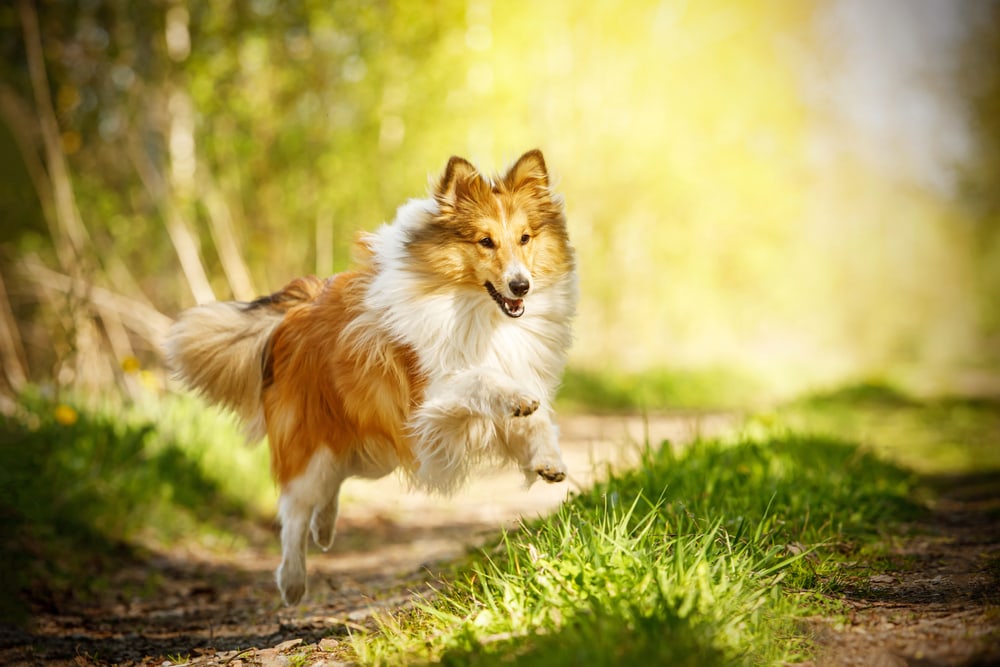
32. Shetland Sheepdog
People believe that the Shetland Sheepdog is a miniature version of a collie, but they’re actually two different breeds. They have a lot more energy and were bred in a separate area of the United Kingdom, specifically Scotland. Although Shelties descended from collies, they are their own breed. People bred them to be herding dogs as well, so they do need much exercise, or else they’ll start putting on a lot of weight that can be bad on their small joints. Grooming is a must, as well as taking care of their teeth since they’re prone to dental disease.
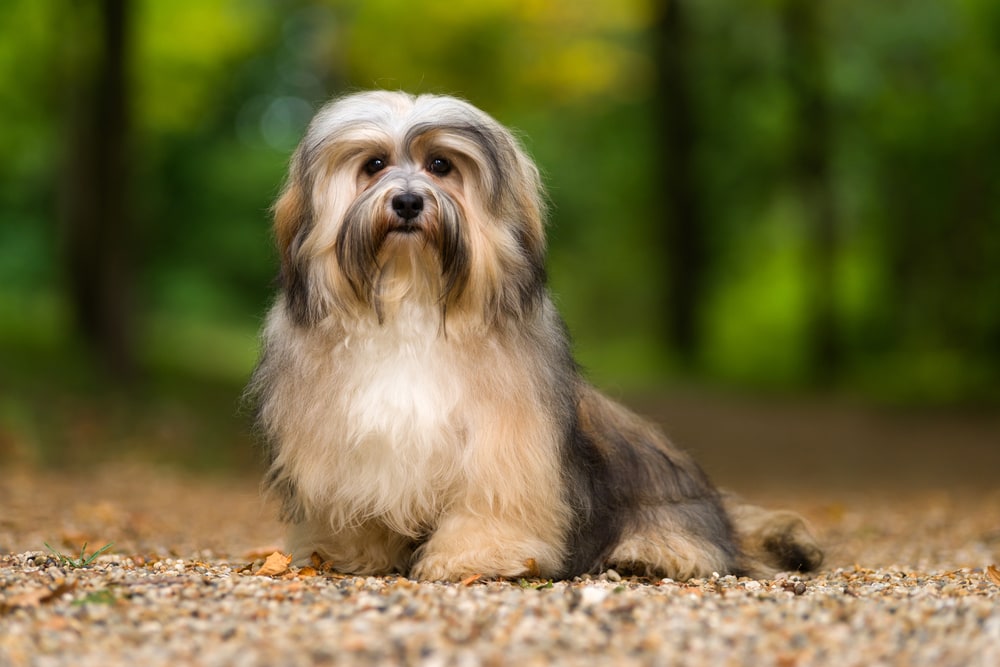
31. Havanese
The Havanese have sometimes been confused with the Maltese at times since they’re both white dogs with long white hair. However, while the Maltese originated in Malta, the Havanese is the only dog breed to originate from Cuba. Another feature that makes them stand out from the Maltese is their curled-over tail. Grooming is required, but keeping their coat trimmed to reduce maintenance is an easy fix. They’re brilliant and are big extroverts, making them very social animals. However, they also make excellent watchdogs when someone is at the door.
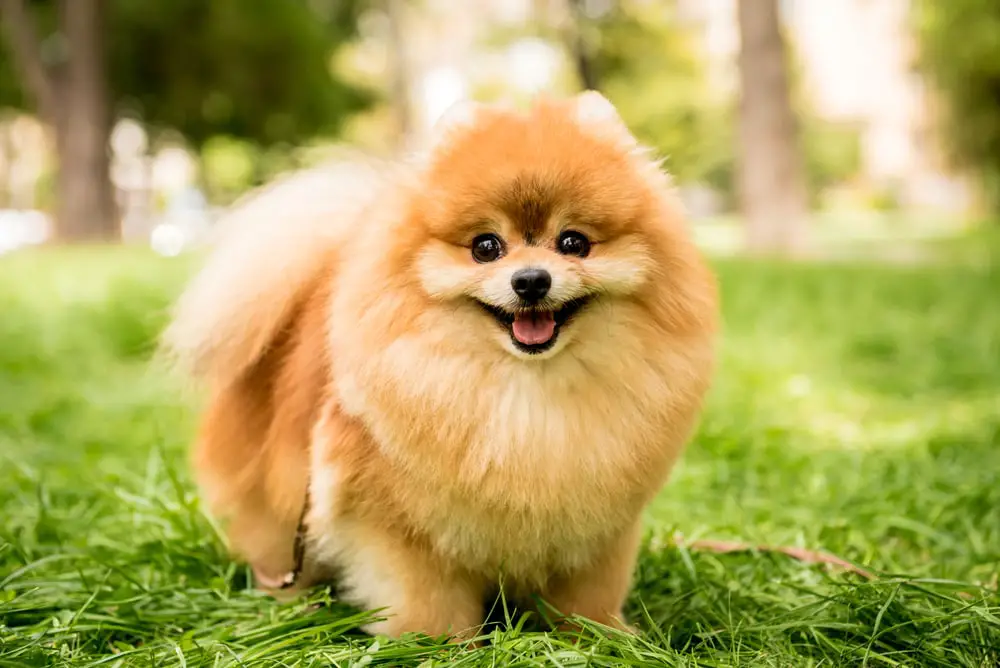
30. Pomeranian
Pomeranians are a member of the Spitz family, which all have thick coats with a particular appearance. Despite his tiny size, he has a huge personality that speaks volumes. Furthermore, he will get loud with his barking too. The Pomeranian is not well-suited to families with small children because they don’t handle rough play very well. They’re more suitable for quiet households with adults, where the Pomeranian can be the center of attention. But don’t let this attitude run too rampant; without discipline, the pom can become very bossy and unruly, even with his owners. They do make good watchdogs, though, and will bark when someone is at the door.
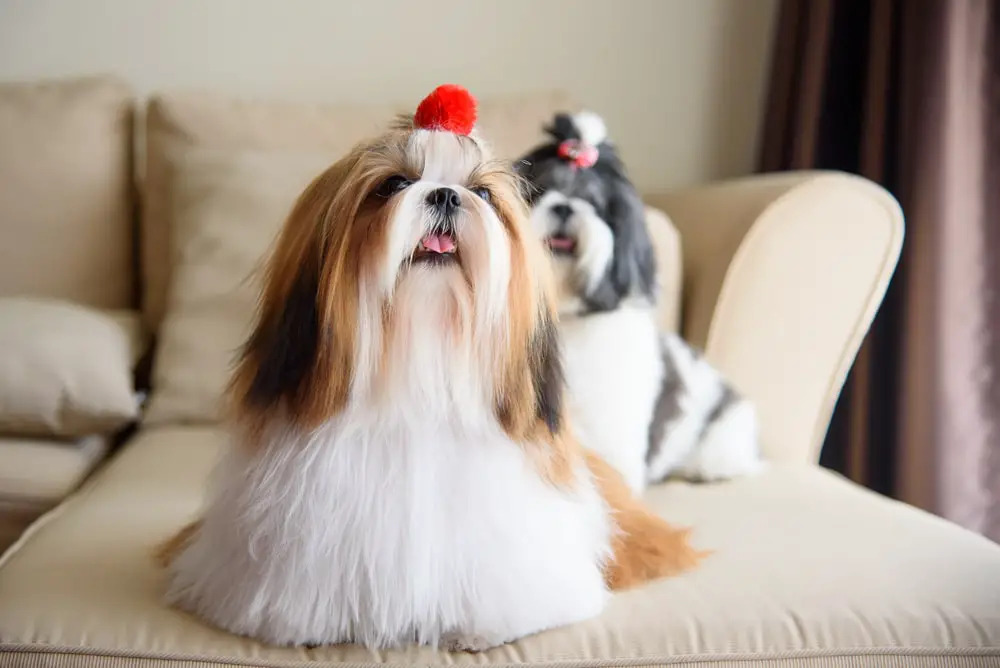
29. Shih Tzu
The Shih Tzu is a small but sturdy dog with a double-haired coat that requires some maintenance. Although this breed is very playful, they’re also known for being quite courageous and taking on anything it doesn’t like, no matter how big it is. This makes them an excellent watchdog in the home. People originally bred it for Chinese noble families, so they have a long history of being pampered. They’re available in a wide range of colors and have a low amount of shedding, making them a perfect dog to keep inside. They’re pretty easy to train, and it’s essential to keep their attitude in check.
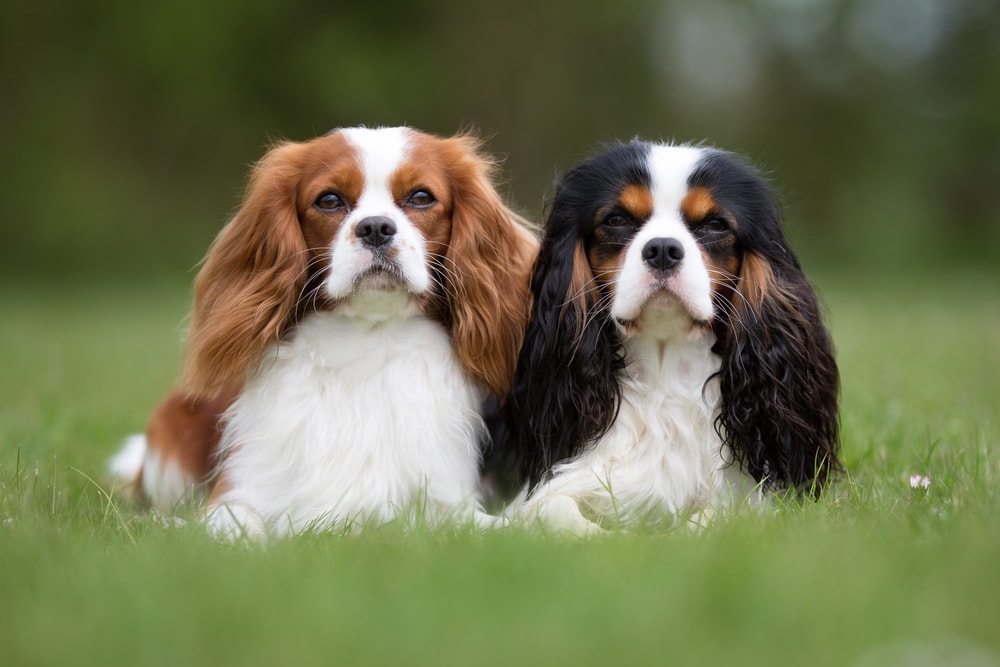
28. Cavalier King Charles Spaniel
The Cavalier King Charles Spaniel is another old breed with a history of nobility. They have an air about them that exudes authority and being an attention-getter… and they would be right. They’re affectionate and easy-going, making them a great pet to have around children. This need for attention causes them to have extrema separation anxiety, so steps need to be taken to curtail this. They can also be a little difficult to house train, so you’ll have to exercise patience in this area… as well as protect your floors.
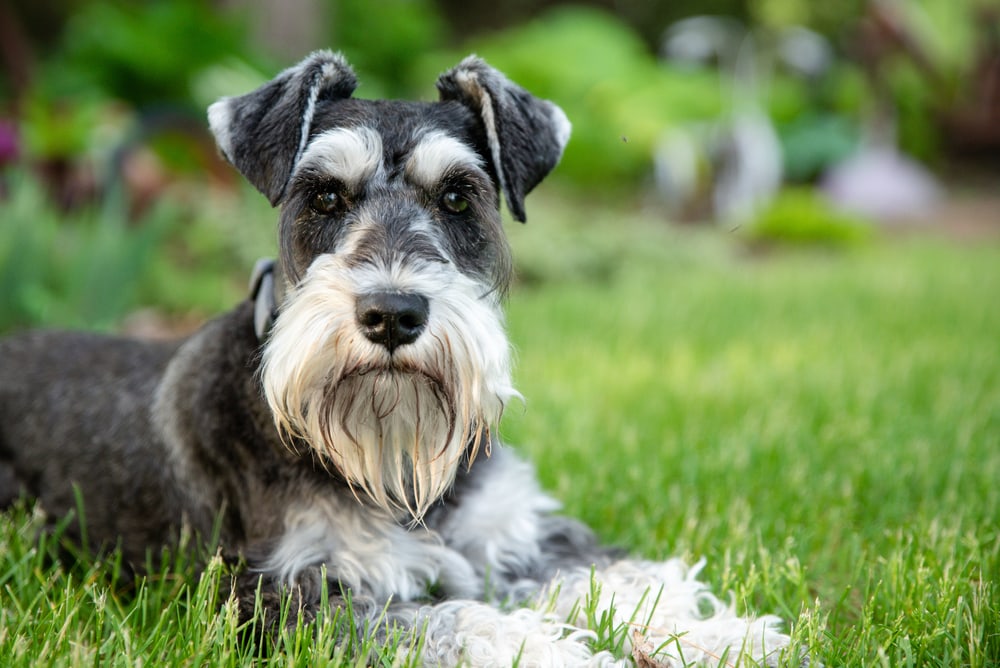
27. Miniature Schnauzer
Although the miniature Schnauzer looks like an older adult from Britain, this breed actually originated in Germany. It’s a hardy and feisty dog that is always eager to be involved in whatever you’re doing. They’re incredibly affectionate with people they know and are also really great with children. They were initially bred to exterminate vermin, giving them a high prey drive, so they should not be left outside unattended if you have small animals or birds in your yard often. This isn’t a couch potato dog, though; they prefer to be relatively active and require an owner who will keep up with them.
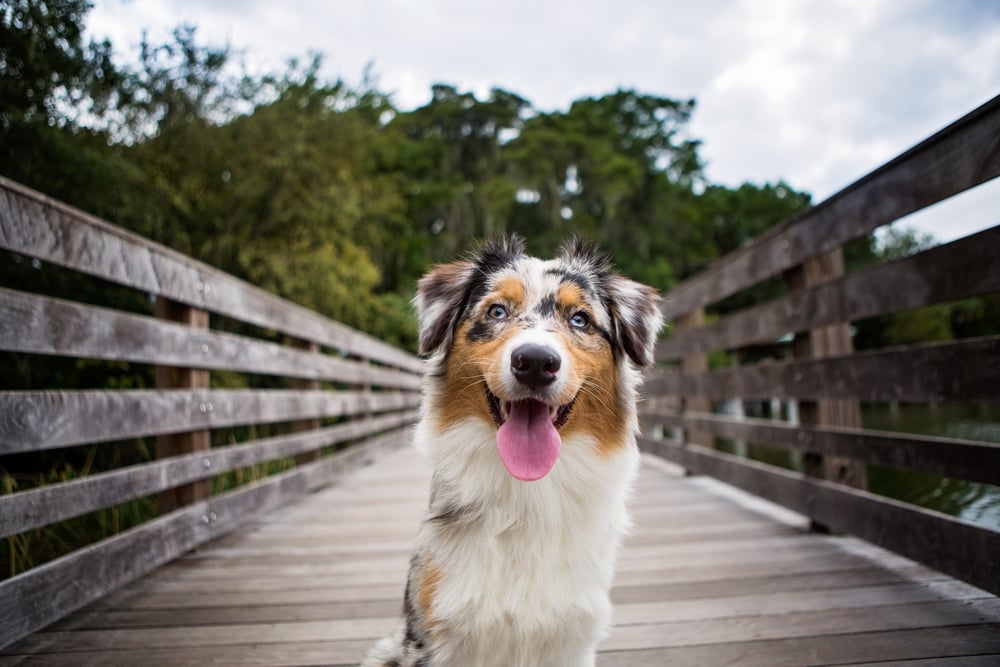
26. Australian Shepherd
Despite the name, Australian Shepherds did not come from Australia. They’re actually an American dog breed, and people bred them to be herding dogs. These dogs are highly intelligent, and you should put their smarts to good use with engaging activities in their daily life. They’re also very active, so a decent amount of exercise is required to keep this dog happy. They pretty much excel in agility training since it engages both the mind and the body at the same time. This isn’t a lazy dog by any means, which means you can’t be either.
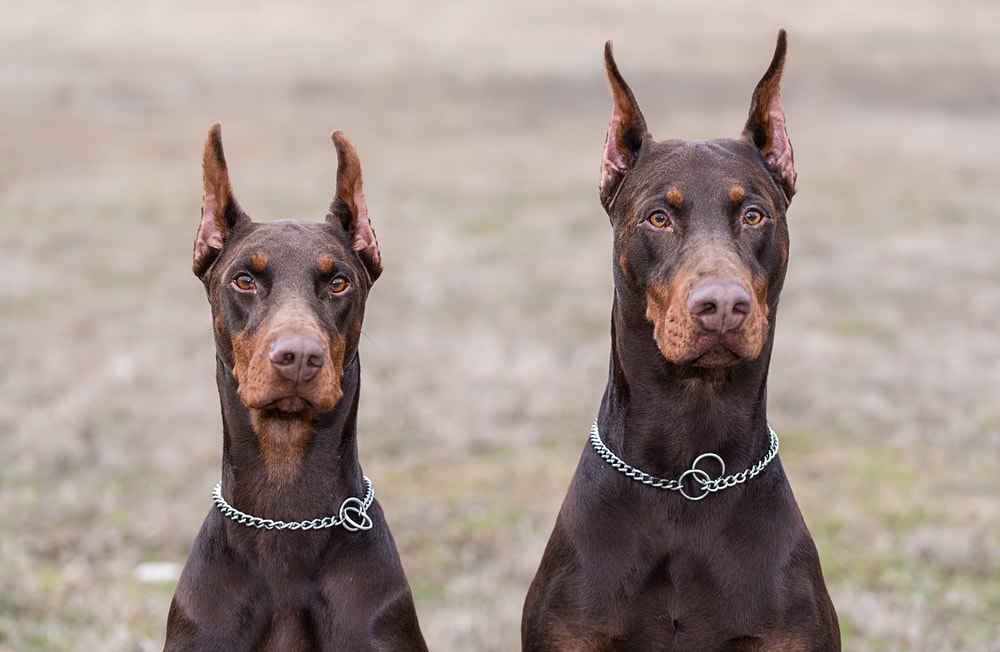
25. Doberman Pinscher
The Doberman Pinscher was initially created in Germany as a protection dog, especially for tax collectors. The media has portrayed this breed as a protector of any kind of property, including junkyards and private homes. Despite this portrayal, they make very loving family pets and are loyal to their owners. Dobermans are quite adaptable too, so if you change your living experiences, they’re willing to go along with it, too, as long as they get to be with their people. Keep in mind that they’re relatively tall and muscular, so you will have to exercise some muscle when training this breed to walk on a leash.
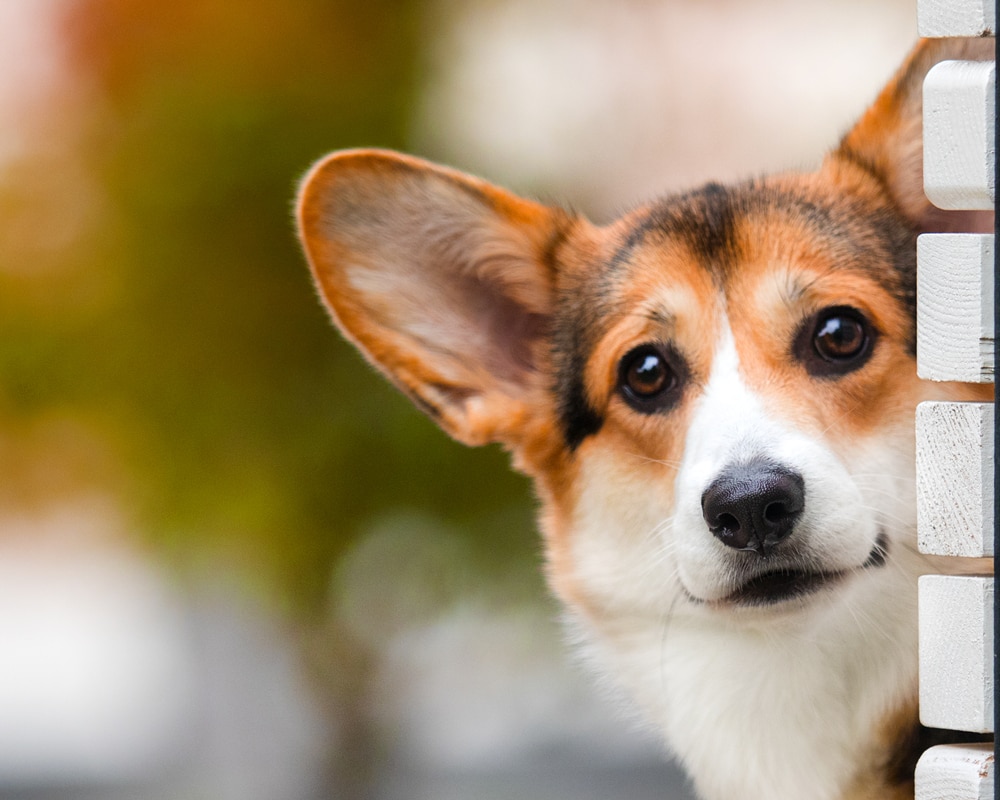
24. Pembroke Welsh Corgi
The Pembroke Welsh Corgi is a British breed and is one of the favorite breeds of the Queen of England. Small, stocky dogs, people bred these corgis to be bull baiters because of how small they are. This means that they require a lot of exercise to stop them from becoming overweight. They work well in apartments as well as farm living, as long as you keep them comfortable and active. Some grooming is required to keep their coats from blowing out inside your home since they can be heavy shedders. Their cheerful appearance definitely puts them up there as one of the more adorable breeds, but it has a working dog attitude behind those eyes.
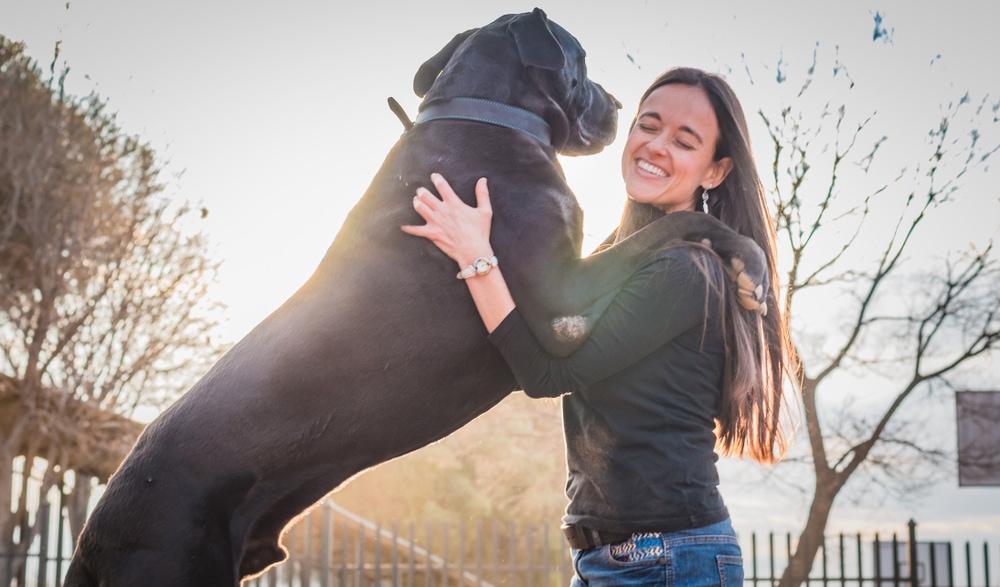
23. Great Dane
The Great Dane is one of the largest dog breeds out there. However, it is actually quite gentle and affectionate with its humans despite its size. Due to its size, it lives a much shorter lifespan than most other breeds. There are a wide variety of coat colors for this breed, and they have a gait that gives them all the grace and poise of a ballerina. Gentle nature aside, intruders may look at the size of a Great Dane and think twice about trying to get inside. They make friends easily and are always looking to make their owners happy.
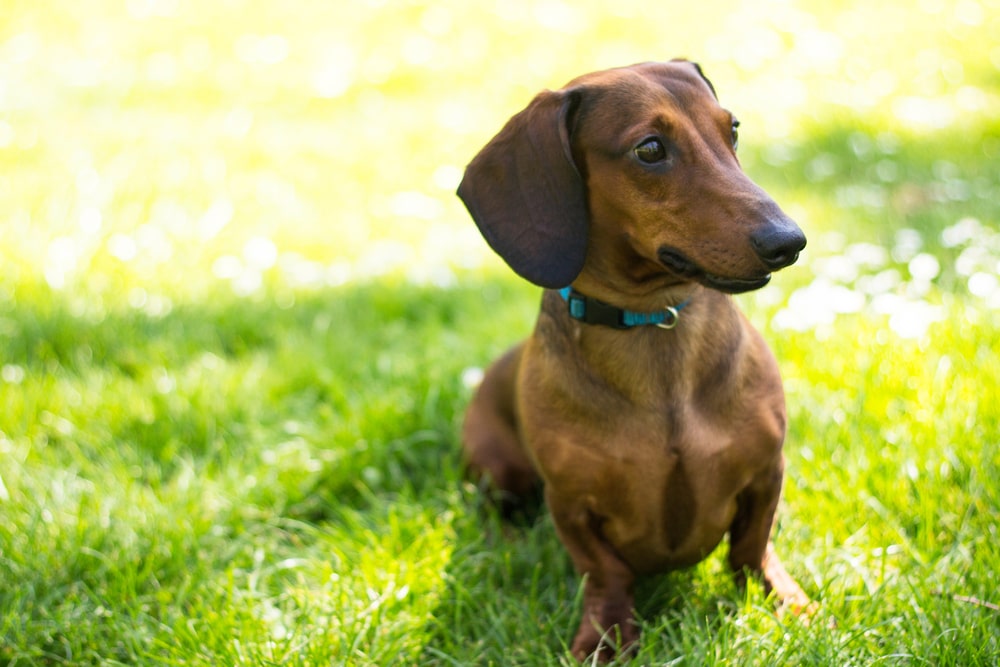
22. Dachshund
Dachshunds may look cute with their stumpy legs and long bodies, but they were actually bred this way for a perfect reason. They look like this in order to get into holes in the ground belonging to badgers, rabbits, or foxes and chase them out. Their powerful feet are good at digging holes so that they can make the hole bigger to get the hunted animals out. Because of their short coat, they’re not very good in cold weather, so you may have to live somewhere warmer or be invested in getting them some doggy jackets when you take them outside.
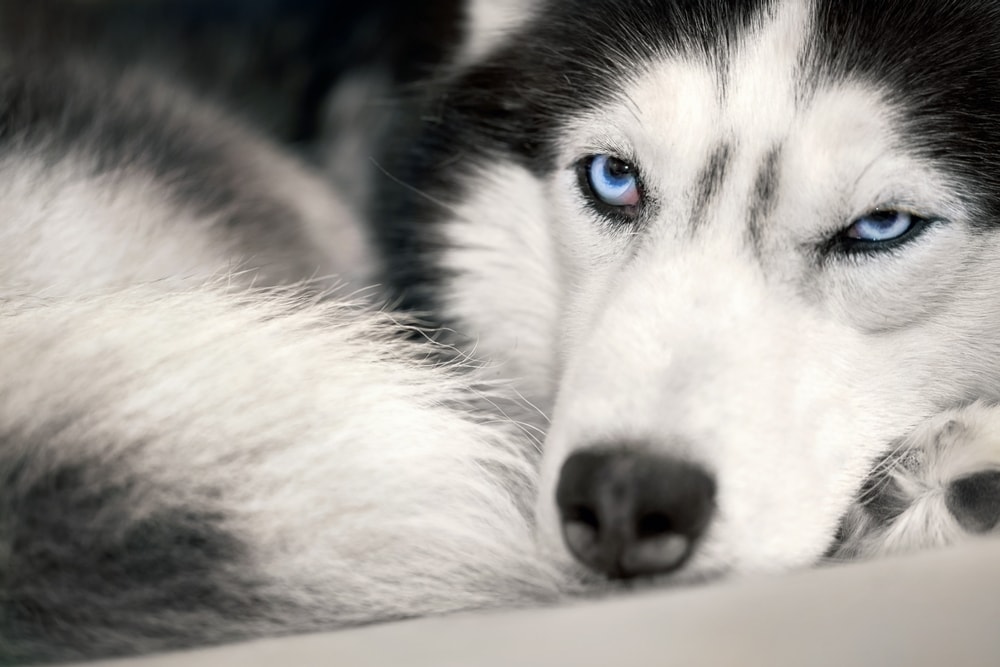
21. Siberian Husky
Siberian Huskies are mostly known for living quite well in freezing climates. They’re built to be sled dogs, but that’s not the only thing they’re good at. They’re adaptable as working dogs in any situation, such as helping the native people of Siberia with their hunting tasks. Their thick double coat helps to protect them in cold climates, but this coat sheds twice a year… a lot. You could keep brushing for hours and still pull out more undercoats. Huskies are vocal dogs too, and with their high emotional intelligence, they have no problems telling you when they don’t like something.
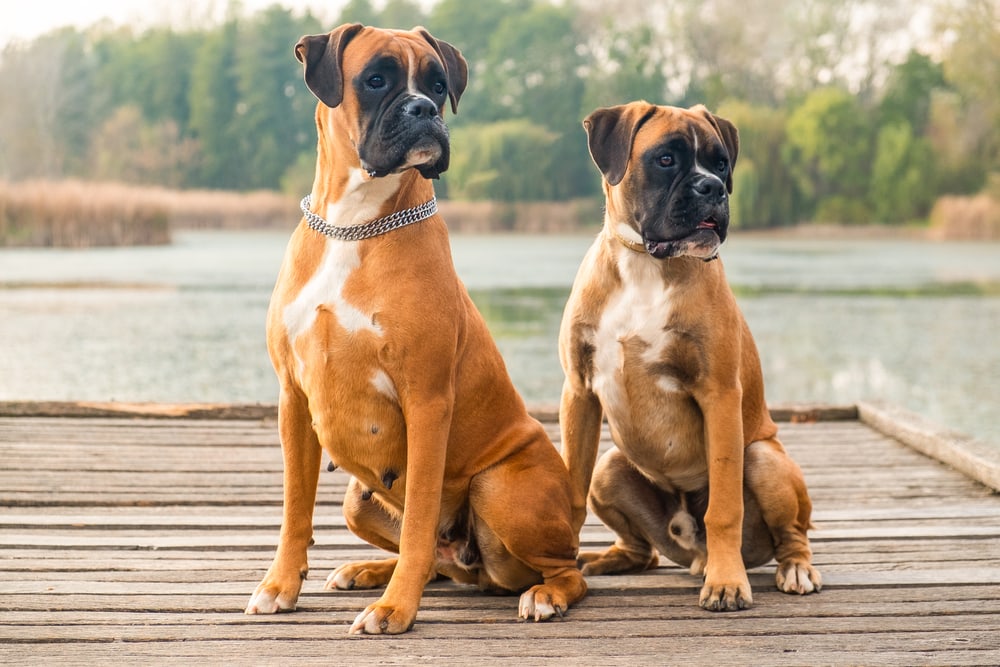
20. Boxer
Boxers are some of the most beloved family dogs you’ll ever be able to find. They do have high energy and require a lot of exercises, but you can get that done a few hours a day with some Frisbee in the yard or a good long walk. Despite their “mean” look, this breed is actually a goofball at heart and knows how to bring a smile to anyone’s face. Because of their face shape and short coat, they don’t work very well in extreme climates, so leaving them outside for long periods of time is not an option.
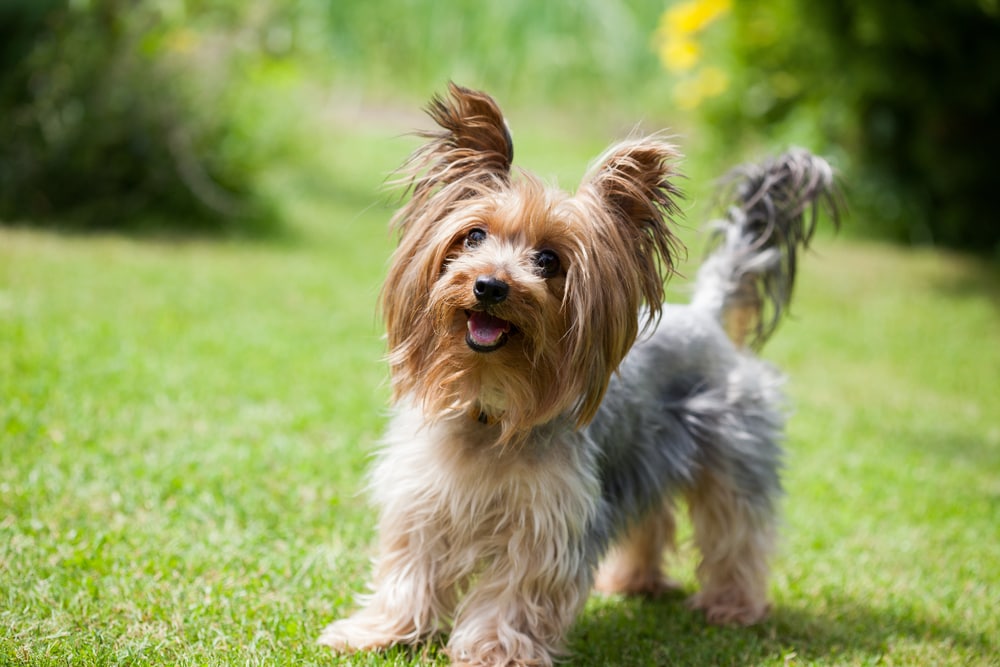
19. Yorkshire Terrier
The Yorkshire Terrier is one of the prized toy dogs that melts people’s hearts. Their cheerful disposition and cute looks make it easy to fall in love with this dog. They started out as rat hunters in mines and texture mills, and that trait has continued throughout the years, giving them a high prey drive. They have quite a big personality in that tiny body and aren’t afraid to be vocal about it. They’re loyal to their owners and make great alert dogs when a stranger is on your property. They’re not big shedders, but you should brush them on a regular basis to keep their coats looking nice.
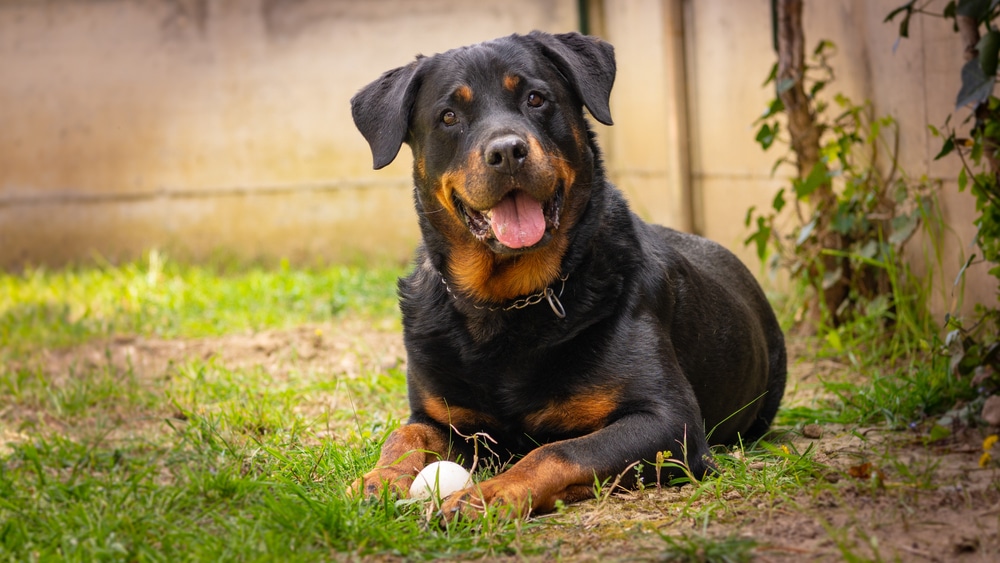
18. Rottweiler
The Rottweiler is a German breed that was bred to drive cattle to the market. This explains why they have such big heads and large chests. They have a deep rough bark, and people use them to protect their property. They can become giant goofballs with people they’re familiar with, willing to roll over for a tummy rub whenever the chance presents itself. You need a firm hand due to their size and strength, and they can be a little stubborn at times, so they’re not the best breed for someone who is getting their first dog.
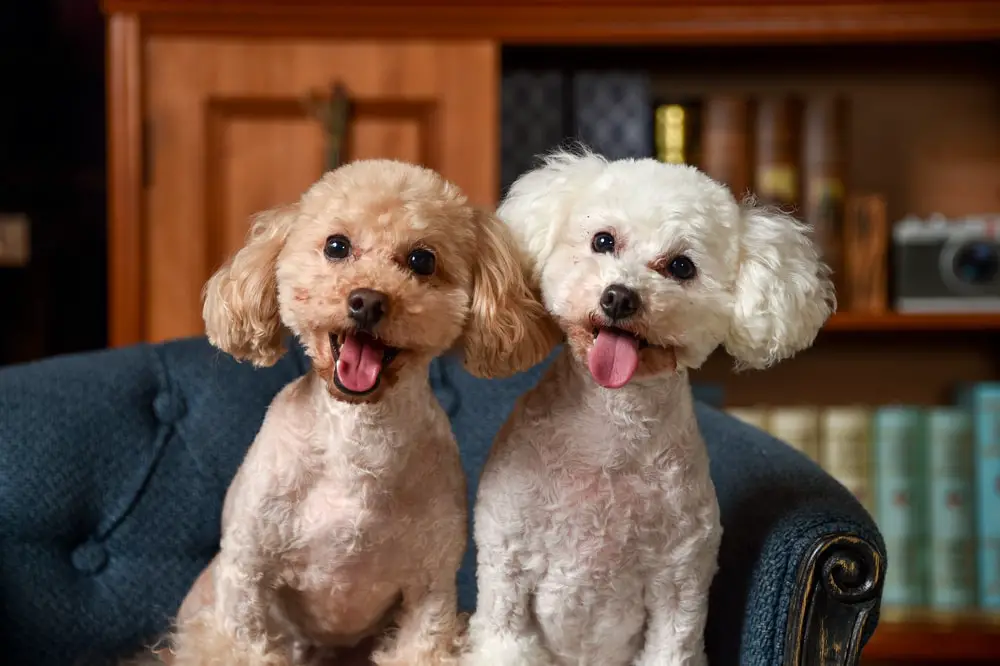
17. Toy Poodle
The toy version of the Poodle is the smallest variant of the breed. However, that doesn’t mean that any of its original instincts aren’t there anymore. Although quite cute, poodles were originally bred to be hunting dogs, especially waterfowl. Their coats will keep them warm against the frigid temperatures in France so that they wouldn’t suffer from shock. This means that this breed requires a lot of exercise and mental stimulation in order to be happy. You can choose to keep this dog trimmed, or you can live with the responsibility of brushing this dog every day to keep their coat tangle-free.
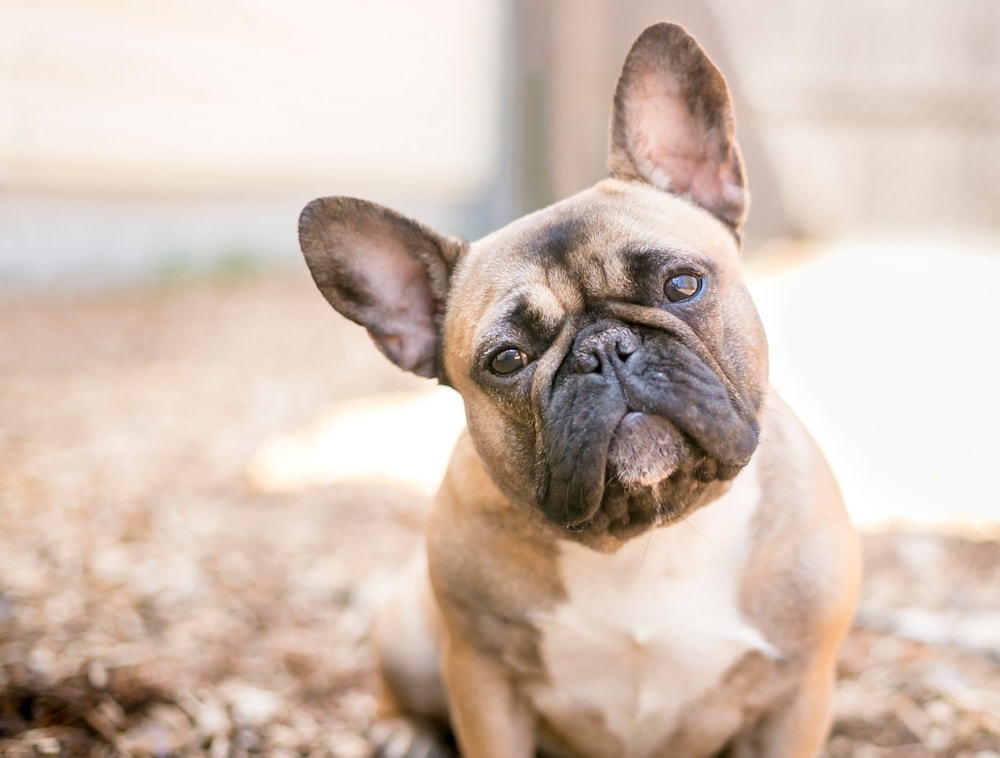
16. French Bulldog
French Bulldogs are not actually from France; the breed actually originated in England, but the creators of the species moved to France. They’re relatively affectionate dogs who care about their owners, and since they don’t require many exercises, they make great dogs to have in apartments. Don’t take them to the beach, though; the size of their head makes them terrible swimmers. This feature also makes it difficult for mothers to give birth, so they often have C-sections. Otherwise, they’re pretty friendly and talkative dogs who won’t hesitate to tell you how they’re feeling.
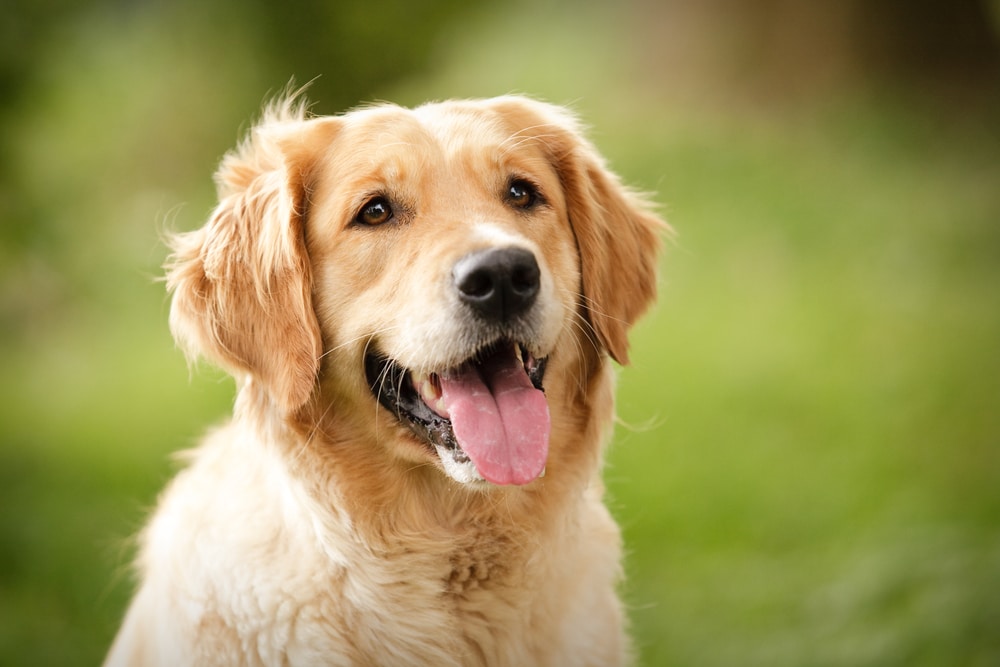
15. Golden Retriever
Many people consider the Golden Retriever to be the “All-American Dog,” but this breed actually originated in Scotland. They bred this animal to be a gundog, but its responsibilities have expanded to encompass helping the blind and being a therapy dog. That’s because this dog is straightforward to train and has an easy disposition that anyone can work with. They take well to water and are pretty good swimmers. They have a very laid-back approach when it comes to life and basically go with the flow with whatever is going on around them.
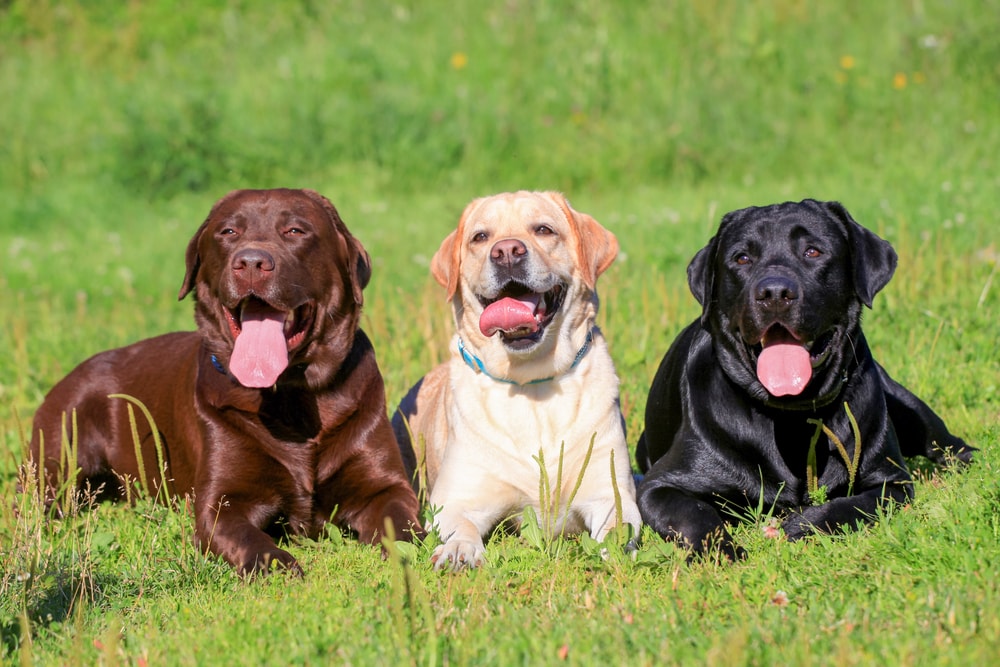
14. Labrador Retriever
The Labrador Retriever is another popular dog breed in almost every home across North America. They’re always eager to show their affection, are extremely intelligent, and are always happy doing activities with their family. They’re gentle dogs to have around children, and people initially bred them as hunting dogs, so they require some exercise. Their coats aren’t exactly short, but they do shed, so they require some maintenance. People use the Labrador as a seeing-eye dog and a therapy dog because they’re always eager to please their owners.
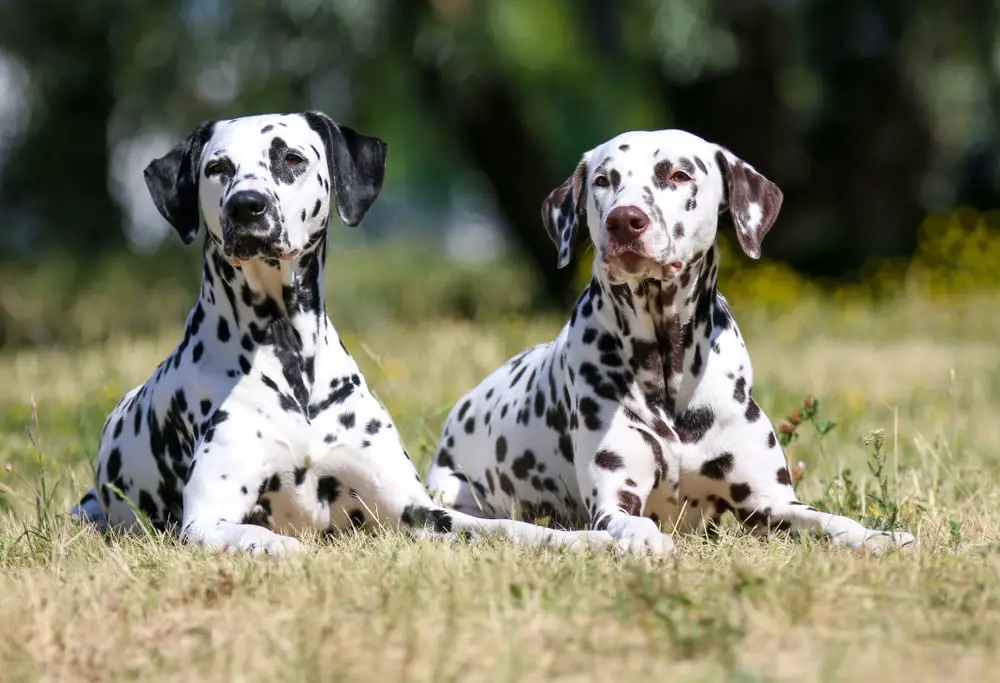
13. Dalmatian
A mascot for the fire department, the Dalmatian, was initially bred to be a hunting dog as well as a carriage dog to keep robbers away. They have quite a graceful silhouette, and the spotted pattern on the fur definitely makes them striking to behold. You may not know that the puppies are actually born without the spots and that their markings start showing up when they’re about two weeks old. They are frequent shedders and do well in active homes that know how to keep them mentally stimulated.
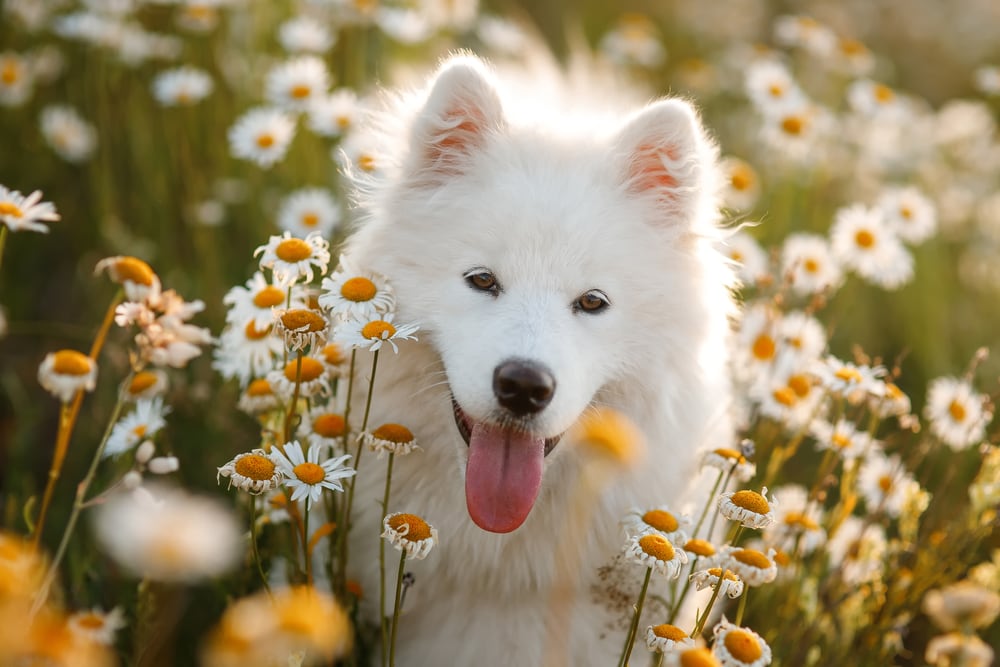
12. Samoyed
The Samoyed is described as a white puffball of a dog, but they look this way for a specific reason. Their thick coats will keep them warm in cold climates, and even their perpetual smile serves a function: it prevents icicles from forming in the corners of their mouths and faces. They are intelligent and social animals but can be pretty mischievous if left unattended for long periods of time. Their thick coats require regular grooming, or you could end up with a very matted dog.
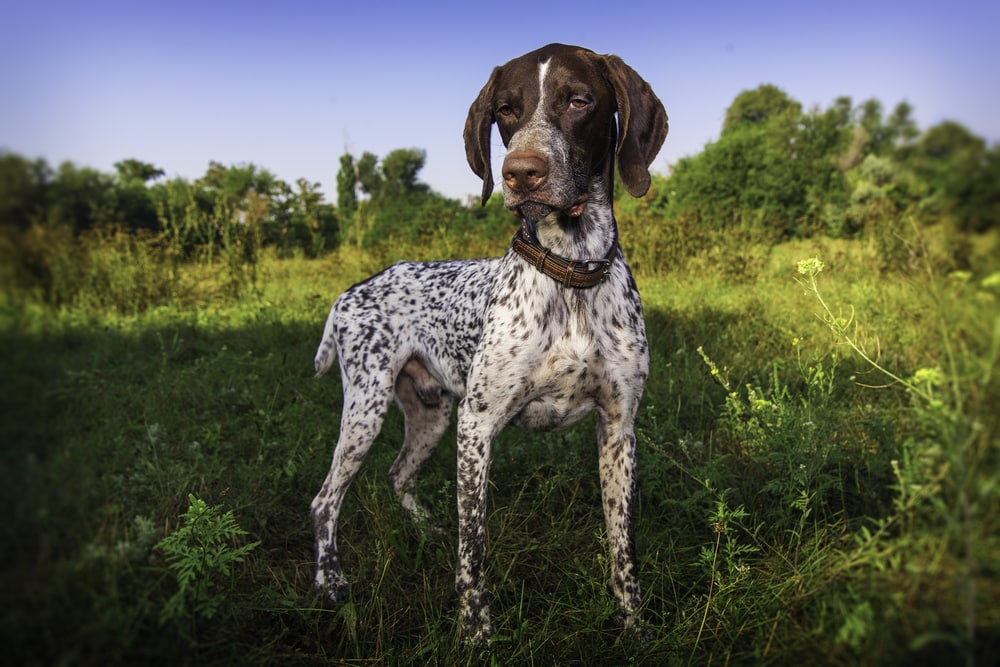
11. French Pointer
The French Pointing Dog has a hunting dog that originated, you guessed it, from France. People bred them to be game and bird hunters, rooting out the tall grasses and pointing where they fell after the owners shot them. They’re very affectionate dogs and relatively playful, being relatively submissive and gentle with those they live with. These dogs are intelligent, easy to train, and eager to make friends with strangers at your door than guarding your house against them. They’re not very independent, which means they’re more likely to stick by your side than to go off and do their own thing.

